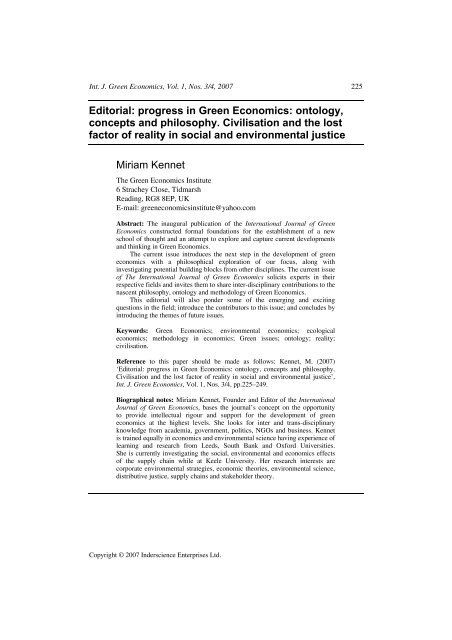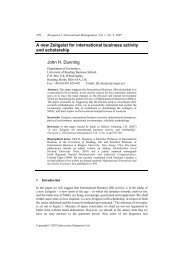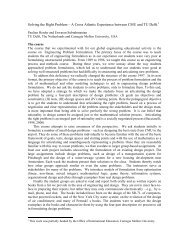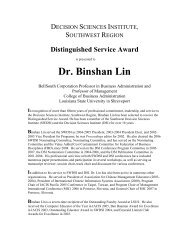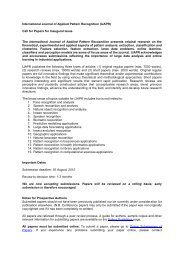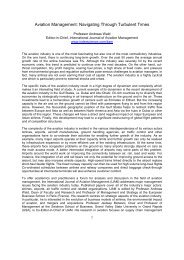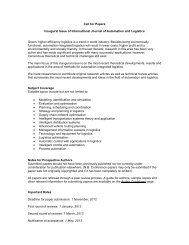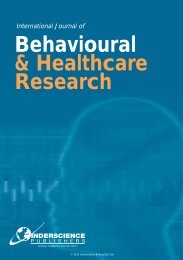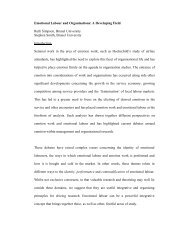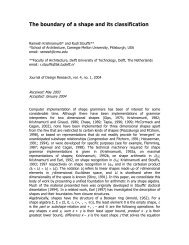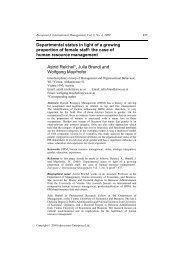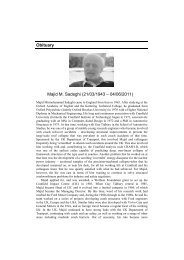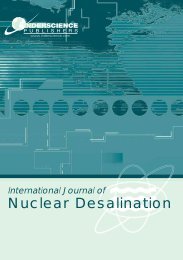Editorial: progress in Green Economics: ontology, concepts and ...
Editorial: progress in Green Economics: ontology, concepts and ...
Editorial: progress in Green Economics: ontology, concepts and ...
You also want an ePaper? Increase the reach of your titles
YUMPU automatically turns print PDFs into web optimized ePapers that Google loves.
Int. J. <strong>Green</strong> <strong>Economics</strong>, Vol. 1, Nos. 3/4, 2007 225<br />
<strong>Editorial</strong>: <strong>progress</strong> <strong>in</strong> <strong>Green</strong> <strong>Economics</strong>: <strong>ontology</strong>,<br />
<strong>concepts</strong> <strong>and</strong> philosophy. Civilisation <strong>and</strong> the lost<br />
factor of reality <strong>in</strong> social <strong>and</strong> environmental justice<br />
Miriam Kennet<br />
The <strong>Green</strong> <strong>Economics</strong> Institute<br />
6 Strachey Close, Tidmarsh<br />
Read<strong>in</strong>g, RG8 8EP, UK<br />
E-mail: greeneconomics<strong>in</strong>stitute@yahoo.com<br />
Abstract: The <strong>in</strong>augural publication of the International Journal of <strong>Green</strong><br />
<strong>Economics</strong> constructed formal foundations for the establishment of a new<br />
school of thought <strong>and</strong> an attempt to explore <strong>and</strong> capture current developments<br />
<strong>and</strong> th<strong>in</strong>k<strong>in</strong>g <strong>in</strong> <strong>Green</strong> <strong>Economics</strong>.<br />
The current issue <strong>in</strong>troduces the next step <strong>in</strong> the development of green<br />
economics with a philosophical exploration of our focus, along with<br />
<strong>in</strong>vestigat<strong>in</strong>g potential build<strong>in</strong>g blocks from other discipl<strong>in</strong>es. The current issue<br />
of The International Journal of <strong>Green</strong> <strong>Economics</strong> solicits experts <strong>in</strong> their<br />
respective fields <strong>and</strong> <strong>in</strong>vites them to share <strong>in</strong>ter-discipl<strong>in</strong>ary contributions to the<br />
nascent philosophy, <strong>ontology</strong> <strong>and</strong> methodology of <strong>Green</strong> <strong>Economics</strong>.<br />
This editorial will also ponder some of the emerg<strong>in</strong>g <strong>and</strong> excit<strong>in</strong>g<br />
questions <strong>in</strong> the field; <strong>in</strong>troduce the contributors to this issue; <strong>and</strong> concludes by<br />
<strong>in</strong>troduc<strong>in</strong>g the themes of future issues.<br />
Keywords: <strong>Green</strong> <strong>Economics</strong>; environmental economics; ecological<br />
economics; methodology <strong>in</strong> economics; <strong>Green</strong> issues; <strong>ontology</strong>; reality;<br />
civilisation.<br />
Reference to this paper should be made as follows: Kennet, M. (2007)<br />
‘<strong>Editorial</strong>: <strong>progress</strong> <strong>in</strong> <strong>Green</strong> <strong>Economics</strong>: <strong>ontology</strong>, <strong>concepts</strong> <strong>and</strong> philosophy.<br />
Civilisation <strong>and</strong> the lost factor of reality <strong>in</strong> social <strong>and</strong> environmental justice’,<br />
Int. J. <strong>Green</strong> <strong>Economics</strong>, Vol. 1, Nos. 3/4, pp.225–249.<br />
Biographical notes: Miriam Kennet, Founder <strong>and</strong> Editor of the International<br />
Journal of <strong>Green</strong> <strong>Economics</strong>, bases the journal’s concept on the opportunity<br />
to provide <strong>in</strong>tellectual rigour <strong>and</strong> support for the development of green<br />
economics at the highest levels. She looks for <strong>in</strong>ter <strong>and</strong> trans-discipl<strong>in</strong>ary<br />
knowledge from academia, government, politics, NGOs <strong>and</strong> bus<strong>in</strong>ess. Kennet<br />
is tra<strong>in</strong>ed equally <strong>in</strong> economics <strong>and</strong> environmental science hav<strong>in</strong>g experience of<br />
learn<strong>in</strong>g <strong>and</strong> research from Leeds, South Bank <strong>and</strong> Oxford Universities.<br />
She is currently <strong>in</strong>vestigat<strong>in</strong>g the social, environmental <strong>and</strong> economics effects<br />
of the supply cha<strong>in</strong> while at Keele University. Her research <strong>in</strong>terests are<br />
corporate environmental strategies, economic theories, environmental science,<br />
distributive justice, supply cha<strong>in</strong>s <strong>and</strong> stakeholder theory.<br />
Copyright © 2007 Inderscience Enterprises Ltd.
226 M. Kennet<br />
1 Background <strong>and</strong> rationale for this next step <strong>in</strong> <strong>Green</strong> <strong>Economics</strong><br />
The urgency of our <strong>Green</strong> <strong>Economics</strong> Project, which is the implementation of social <strong>and</strong><br />
environmental justice, has accelerated s<strong>in</strong>ce the <strong>in</strong>ception of the journal. Social <strong>and</strong><br />
environmental <strong>in</strong>justice significantly affect the world economy. Dr. Rajendra Pachauri,<br />
the chair of the Intergovernmental Panel on Climate Change, warns that “the very<br />
survival of the human species is at risk” (Lean, 2005). Public perception of our position<br />
<strong>in</strong> the world is alter<strong>in</strong>g, <strong>and</strong> the fragility of our survival <strong>and</strong> well-be<strong>in</strong>g, our economy <strong>and</strong><br />
security is becom<strong>in</strong>g much more evident (Pachauri, 2007; Stern, 2006; Raudsepp-Hearne<br />
et al., 2005). Pachauri <strong>in</strong> McCarthy (2007) worries that “we are do<strong>in</strong>g th<strong>in</strong>gs that have<br />
not happened <strong>in</strong> the last 650,000 years”.<br />
The polar ice caps are contract<strong>in</strong>g at 7% per decade <strong>and</strong> may completely disappear,<br />
creat<strong>in</strong>g an ice-free arctic by the end of this century. Sea levels are expected to rise by<br />
at least 3.1 cm per decade or between 40 <strong>and</strong> 59 cm over the century (Pearce, 2007,<br />
pp.8–9; Pachauri, 2007) <strong>and</strong> this could permanently displace up to 200 million people<br />
(Stern, 2006). In the case of the Bangladesh delta environment, a full 2 m global rise <strong>in</strong><br />
sea level coupled with a 1 m rise <strong>in</strong> local subsidence, would lead to a loss of 26% of<br />
habitable l<strong>and</strong> (Viles <strong>and</strong> Spencer, 1995). It is also reported that the Gulf Stream had<br />
reduced by 30% between 1957 <strong>and</strong> 2004 (Pachauri, 2007). With predicted global<br />
warm<strong>in</strong>g of between +2% to +4.5% or up to +6C by 2100 (Lynas, 2007), – the warmest<br />
period on earth s<strong>in</strong>ce the time of the d<strong>in</strong>osaurs – coral reefs could become almost ext<strong>in</strong>ct;<br />
Amazonian ra<strong>in</strong>forests will turn to desert; with up to 40% of species becom<strong>in</strong>g ext<strong>in</strong>ct<br />
(Stern, 2006); drought would severely reduce most African <strong>and</strong> Mediterranean<br />
agricultural yields with desert encroachment <strong>in</strong> Italy, Spa<strong>in</strong> <strong>and</strong> Greece (Stern, 2006,<br />
pp.18–19), mak<strong>in</strong>g polar regions attractive to farm.<br />
The Millennium Ecosystem Services Assessment (Raudsepp-Hearne et al., 2005)<br />
found that “60% of a group of 24 ecosystem services exam<strong>in</strong>ed by the MA are be<strong>in</strong>g<br />
degraded: this is the first comprehensive audit of the status of Earth’s natural capital”.<br />
There has been a rise <strong>in</strong> non-l<strong>in</strong>ear events, <strong>in</strong>clud<strong>in</strong>g: “disease emergence, abrupt<br />
alterations <strong>in</strong> water quality, the creation of ‘dead zones’ <strong>in</strong> coastal waters, the collapse of<br />
fisheries, <strong>and</strong> shifts <strong>in</strong> regional climate”, as well as the specific threat to dryl<strong>and</strong>s. “These<br />
ecosystems are particularly fragile, but they are also the places where human population<br />
is grow<strong>in</strong>g most rapidly, biological productivity is least, <strong>and</strong> poverty is highest”. Nutrient<br />
load<strong>in</strong>g was also found to be an important driver of ecosystem damage such as climate<br />
change <strong>and</strong> habitat loss.<br />
All of these changes are believed to be develop<strong>in</strong>g, which makes our task urgent<br />
<strong>and</strong> compell<strong>in</strong>g. If noth<strong>in</strong>g is done, the Stern (2006) Report, predicts a fall of between<br />
3%–5% <strong>in</strong> global output each year, with a comb<strong>in</strong>ed decrease <strong>in</strong> global consumption<br />
of 20%.<br />
Further, our current economic system perpetuates poverty, <strong>in</strong>equality <strong>and</strong> social<br />
<strong>in</strong>justice. This is supported by a UNICEF Report (2007) about the well be<strong>in</strong>g of young<br />
people <strong>in</strong> the UK, a country which has the fifth largest economy <strong>in</strong> the world, but it has<br />
the overall worst st<strong>and</strong>ards among the 25 richest nations, <strong>in</strong> terms of the well be<strong>in</strong>g <strong>and</strong><br />
happ<strong>in</strong>ess of its young people.
<strong>Editorial</strong> 227<br />
“The UK ranks <strong>in</strong> the bottom third of the country rank<strong>in</strong>gs for five of the six<br />
dimensions reviewed. Although, higher <strong>in</strong> the educational well-be<strong>in</strong>g<br />
dimension, the UK lags beh<strong>in</strong>d <strong>in</strong> terms of relative poverty <strong>and</strong> deprivation,<br />
quality of children’s relationships with their parents <strong>and</strong> peers, child health <strong>and</strong><br />
safety, behaviour <strong>and</strong> risk-tak<strong>in</strong>g <strong>and</strong> subjective well-be<strong>in</strong>g.”<br />
The report raises significant questions about how the pursuit of economic wealth, as<br />
current atta<strong>in</strong>ed <strong>and</strong> measured, may actually detract from contentment, when it reduces<br />
time spent with family <strong>and</strong> friends or meet<strong>in</strong>g people’s fundamental needs.<br />
Seventy percent of the world’s 1.2 billion people <strong>in</strong> life threaten<strong>in</strong>g poverty,<br />
accord<strong>in</strong>g to a UN Report (Firth, 2006) are women <strong>and</strong> children. Only 1% of the world’s<br />
titled l<strong>and</strong> belongs to women (Firth, 2006). Gendered domestic violence is the s<strong>in</strong>gle<br />
largest global cause of female morbidity, more than war, traffic accidents, <strong>and</strong> cancer!<br />
(Smith, 2006). It is therefore vital to redress the balance of poverty <strong>and</strong> power between<br />
men <strong>and</strong> women on the planet. Significantly, Wangari Maathai w<strong>in</strong>ner of the Nobel<br />
Peace Prize for plant<strong>in</strong>g trees was herself subject to domestic violence (Newman, 2007).<br />
She regards her most important achievement as becom<strong>in</strong>g the first woman <strong>in</strong> Kenya to<br />
atta<strong>in</strong> a doctorate <strong>in</strong> science <strong>and</strong> is proud to be a passionate human rights activist. Even <strong>in</strong><br />
her extreme success, as a Nobel Prize W<strong>in</strong>ner, she still struggles to be recognised as a<br />
serious scientist. In fact she expla<strong>in</strong>s the th<strong>in</strong>gs that matter <strong>in</strong> society. She likens this to an<br />
African stool.<br />
“The three legs represent three critical pillars of a just <strong>and</strong> stable society. The<br />
first leg st<strong>and</strong>s for democratic space, where rights are respected, whether they<br />
are human rights, women’s rights, children’s rights, or environmental rights.<br />
The second represents susta<strong>in</strong>able <strong>and</strong> equitable management of resources. The<br />
third represents cultures of peace. The seat represents society <strong>and</strong> its prospects<br />
for development.”<br />
Maathai (2007, p.295) says that she aimed to protect the world’s second lung, The Congo<br />
Bas<strong>in</strong> Forest. These three pillars have got lost <strong>in</strong> the drive for global economic success,<br />
ever <strong>in</strong>creas<strong>in</strong>g profit, <strong>in</strong>dustrial productivity <strong>and</strong> trade flows as def<strong>in</strong>ed by ma<strong>in</strong>stream<br />
economics. This drive has, up to now, justified the complete destruction of much of our<br />
habitat, <strong>and</strong> this is what <strong>Green</strong> <strong>Economics</strong> seeks to addresses <strong>and</strong> start to reverse.<br />
2 The mean<strong>in</strong>g of <strong>Green</strong> <strong>Economics</strong><br />
Primarily the aim <strong>and</strong> mean<strong>in</strong>g of green economics is to create economic conditions<br />
where social <strong>and</strong> environmental justice thrives <strong>and</strong> benefits all people everywhere, as<br />
well as non-human species, nature, the planet <strong>and</strong> its systems. New analyses from the<br />
<strong>Green</strong> <strong>Economics</strong> Project are start<strong>in</strong>g to conceptualise alternative methods <strong>and</strong> solutions<br />
to deal with current gross <strong>in</strong>justices <strong>and</strong> result<strong>in</strong>g damage to societies <strong>and</strong> to ecology.<br />
2.1 <strong>Green</strong> <strong>Economics</strong> has a wide <strong>and</strong> <strong>in</strong>clusive scope<br />
I am often asked what green economics means, <strong>and</strong> I believe it signifies the means for<br />
implementation of social <strong>and</strong> environmental justice, both as a ‘means’ for change <strong>and</strong> its<br />
atta<strong>in</strong>ment as an ‘end’ <strong>in</strong> itself. The dilemma is how to reconcile what can <strong>and</strong> often do<br />
appear to be contradictory choices favour<strong>in</strong>g the environment over justice or vice versa.<br />
We cannot have one option <strong>in</strong>stead of another one, as they are ultimately <strong>in</strong>terdependent.
228 M. Kennet<br />
We must jo<strong>in</strong> up our th<strong>in</strong>k<strong>in</strong>g <strong>and</strong> consider all the factors. This is the exact opposite of<br />
current th<strong>in</strong>k<strong>in</strong>g <strong>in</strong> ma<strong>in</strong>stream economics practice where awkward elements are factored<br />
out <strong>and</strong> dismissed as ‘externalities’.<br />
As already mentioned, to reduce <strong>in</strong>equality <strong>and</strong> <strong>in</strong>justice <strong>and</strong> to promote equity are<br />
important ways to provide social <strong>and</strong> environmental justice at the same time. To be an<br />
environmentalist or a green without consider<strong>in</strong>g social justice as well, will not achieve<br />
this. For example, the education of women reduces the birth rate, which <strong>in</strong> turn reduces<br />
population, which <strong>in</strong> turn reduces pressure on ecological resources.<br />
In less developed countries, the exploitation of people <strong>in</strong> poorly paid farm labour <strong>and</strong><br />
<strong>in</strong> sweatshops, exploit<strong>in</strong>g crops <strong>and</strong> resources such as water, to supply goods to the global<br />
supply cha<strong>in</strong>, entails environmental degradation <strong>and</strong> even desertification. The over-use of<br />
water to grow salads for developed countries’ supermarkets, for example, reduces equity<br />
of access to local resources for local people. The global extension of multiple retailers’<br />
supply cha<strong>in</strong>s through off-shor<strong>in</strong>g, near-shor<strong>in</strong>g <strong>and</strong> host country subcontract<strong>in</strong>g<br />
<strong>in</strong>creases product miles travelled, thus <strong>in</strong>creas<strong>in</strong>g the carbon footpr<strong>in</strong>t. In the long run, the<br />
whole of humanity <strong>and</strong> the planet loose out.<br />
2.2 <strong>Green</strong> <strong>Economics</strong> explores evolv<strong>in</strong>g realities<br />
The green economics philosophy approach requires that our economics models reflect<br />
real complexity. Current world trade systems require us develop better tools for analysis.<br />
Simplistic common economic assessment tools such as comparative advantage or cost<br />
benefit analysis do not provide a complete picture of today’s <strong>in</strong>creas<strong>in</strong>gly complex<br />
<strong>in</strong>tra-<strong>in</strong>dustry <strong>and</strong> <strong>in</strong>tra-firm trade, which is currently estimated at 40% of all goods<br />
exchanged, (Ietto-Gilies, 2006). The ‘truth’ or the wise choice or ‘answer’ <strong>in</strong>sofar as it<br />
exists, is often hidden, unclear, multi layered <strong>and</strong> multi faceted. We have begun to model<br />
this with such tools as Geographical Information Systems <strong>and</strong> climate modell<strong>in</strong>g, <strong>and</strong> so<br />
we can no longer afford a simplistic economics path, which ‘factors out the facts’. We<br />
cannot possibly hope to underst<strong>and</strong> or expla<strong>in</strong> all the complexities of reality, but<br />
economics must accept that they exist <strong>and</strong> we must beg<strong>in</strong> to factor many of them <strong>in</strong>.<br />
2.3 Community <strong>and</strong> responsibility: positions <strong>in</strong> <strong>Green</strong> <strong>Economics</strong><br />
One of the dist<strong>in</strong>guish<strong>in</strong>g aspects of the green position accord<strong>in</strong>g to Salleh (1997, p.4) is<br />
that “<strong>Green</strong>s assume that s<strong>in</strong>ce environmental damage impacts on people universally, it is<br />
to everyone’s advantage to solve it. No particular group<strong>in</strong>g is seen to be better placed<br />
than any other to save the earth from human excess”. This is <strong>in</strong> contrast to the socialist<br />
position, which argues that damage is caused by capitalists <strong>and</strong> capitalism <strong>and</strong> also to<br />
Porritt (1984, p.116) who proposed that middle class entrepreneurs would ultimately<br />
become the agents of change, <strong>and</strong> to Dobson (2000) who suggested that conditions, not<br />
simply people themselves, must change.<br />
The dilemma is not ‘do we save the planet by coercion?’ so that people <strong>and</strong> planet<br />
have a better bundle of resources <strong>and</strong> are enhanced, but rather “do we go much further<br />
with our decision mak<strong>in</strong>g <strong>and</strong> <strong>in</strong>vestigate the consequences of our actions <strong>and</strong> choices?”<br />
Just as there is no place called ‘away’ as <strong>in</strong> ‘throw it away’, there is similarly no activity<br />
without consequences <strong>and</strong> we need to underst<strong>and</strong> <strong>and</strong> to factor consequences <strong>in</strong>to our<br />
<strong>concepts</strong> of reality <strong>and</strong> <strong>in</strong>to our explanations.
<strong>Editorial</strong> 229<br />
Jacobs (1991, p.x) dist<strong>in</strong>guished between people who are greens <strong>and</strong> people who are<br />
environmentalists. He suggests that ‘green’ denotes:<br />
“a person whose commitment to the environment, (human k<strong>in</strong>d’s spiritual<br />
home, not simply a source of wealth) is part of a broader ideology which<br />
places emphasis on humank<strong>in</strong>d’s relationship with the rest of the natural<br />
world, <strong>and</strong> who seeks a society based on non-materialist, decentralist, <strong>and</strong><br />
cooperative values.”<br />
Dryzek (1997) provides a fasc<strong>in</strong>at<strong>in</strong>g analysis of the spectrum of green positions,<br />
from those who believe the market will adjust price mechanisms to provide the solutions,<br />
those who believe <strong>in</strong> adm<strong>in</strong>istrative <strong>and</strong> regulatory solutions, those who believe <strong>in</strong> eco<br />
modernisation (Barry, 2007), those who believe <strong>in</strong> the human capability for problem<br />
solv<strong>in</strong>g <strong>and</strong> lifestyle greens; <strong>and</strong> green activists. Dryzek (1997) identifies <strong>Green</strong> Radicals,<br />
who are divided <strong>in</strong>to <strong>Green</strong> Romantics <strong>and</strong> <strong>Green</strong> Rationalists. <strong>Green</strong> Romantics reject<br />
much of the enlightenment <strong>and</strong> see salvation with<strong>in</strong> <strong>in</strong>dividual consciousness rais<strong>in</strong>g, <strong>and</strong><br />
<strong>in</strong>clude deep ecologists, bio-regionalists <strong>and</strong> some anti-globalisation activists. These are<br />
contrasted with <strong>Green</strong> Rationalists, <strong>in</strong>clud<strong>in</strong>g animal rights activists, who largely embrace<br />
much of the enlightenment agenda of equity, reason, rights, science <strong>and</strong> <strong>progress</strong> but they<br />
all reject <strong>in</strong>dustrialism, as currently constructed although changes with<strong>in</strong> <strong>in</strong>dustrialism are<br />
advocated by Hawken et al. (2005) <strong>and</strong> by Korhonen <strong>and</strong> Strachan (2004) through<br />
<strong>in</strong>dustrial ecology. Other environmentalists argue for a market based solution (Anderson<br />
<strong>and</strong> Leal, 2005) or solutions based on <strong>in</strong>centives, such as price or technology or<br />
susta<strong>in</strong>able development (Redclift, 1987; Schmeidhe<strong>in</strong>y, 1992). They seek transformation<br />
<strong>and</strong> a compatibility between bus<strong>in</strong>ess as usual <strong>and</strong> ecological improvements. Ecological<br />
modernisers also seek compatibility between economic growth <strong>and</strong> the imperative to<br />
protect environmental quality, perhaps through environmentally friendly products for<br />
example (Barry, 2005, p.304). Pigou (1920) suggested that market failures actually<br />
caused environmental degradation <strong>and</strong> that the political processes could correct the<br />
problem. Countries such as Germany, Japan, the Netherl<strong>and</strong>s, Norway <strong>and</strong> Sweden have<br />
pursued strategies towards environmental excellence <strong>in</strong> <strong>in</strong>dustrial products, (Dryzek,<br />
1997, p.137). <strong>Green</strong> economics position along this spectrum seems likely to be <strong>in</strong> the<br />
radical <strong>Green</strong> Rationalists area but with strong <strong>in</strong>fluences from the <strong>Green</strong> Romantics.<br />
2.4 Exist<strong>in</strong>g def<strong>in</strong>itions <strong>and</strong> descriptions of green economics<br />
Bateman (1997, p.37) describes the green economy as “an extension of the conventional<br />
economic approach to encompass, among others, distributional equity, <strong>and</strong> environmental<br />
quality objectives”.<br />
He suggests that this could <strong>in</strong>volve:<br />
• “the rejection of unlimited dem<strong>and</strong>s <strong>and</strong> wants by rational economic man (homo<br />
economicus), the archetypal selfish (greedy) <strong>in</strong>habitant of the unfettered market<br />
economy <strong>and</strong> <strong>in</strong> favour of a more collective economy based on people’s needs”.<br />
• “an economy that is capable of replicat<strong>in</strong>g itself on a susta<strong>in</strong>able basis”<br />
• evolution over time to decouple the growth <strong>in</strong> economic output (activity) from the<br />
environmental impacts<br />
• the use of technical changes to be more efficient<br />
• freez<strong>in</strong>g or reduction of the levels of rates of change <strong>in</strong> the economy <strong>and</strong> population.
230 M. Kennet<br />
Anderson (2006) identifies several possible postures <strong>in</strong> relation to the boundaries drawn<br />
around conventional economics. These are: conventional economics operat<strong>in</strong>g with<strong>in</strong> its<br />
boundary; environmental economics as ventur<strong>in</strong>g beyond the boundary but on the basis<br />
of the paradigm <strong>and</strong> assumptions provided by what is with<strong>in</strong> the boundary; green<br />
economics that “is not only not constra<strong>in</strong>ed by the boundary but also profoundly<br />
suspicious about the boundary <strong>and</strong> what goes on there”. Anderson (2006) also describes<br />
green economics as concern<strong>in</strong>g itself with “the <strong>in</strong>teraction between human economic<br />
activity <strong>and</strong> the natural world, <strong>and</strong> both directions of that <strong>in</strong>teraction, human dependence<br />
on the natural world <strong>and</strong> the human impact on it. At the centre of <strong>Green</strong> <strong>Economics</strong> is the<br />
underst<strong>and</strong><strong>in</strong>g that the economy is dependent on the natural world <strong>and</strong> could not exist<br />
without it” (pp.18–19).<br />
2.5 Balanc<strong>in</strong>g social <strong>and</strong> environmental equity <strong>in</strong> a practical way<br />
Kennet <strong>and</strong> He<strong>in</strong>emann (2006a) suggest that the social equity <strong>in</strong> green economics goes<br />
further than distributional equity, (currently used by ma<strong>in</strong> stream economists) as it<br />
<strong>in</strong>volves ensur<strong>in</strong>g that a social transformation is achieved both dur<strong>in</strong>g the process <strong>and</strong><br />
also <strong>in</strong> the end, rather than conf<strong>in</strong><strong>in</strong>g economic analysis with<strong>in</strong> subjective boundaries of<br />
distribution activity <strong>and</strong> this is a very important dist<strong>in</strong>ction. Similarly, environmental<br />
quality is a more limited concept <strong>and</strong> does not require consideration of the impacts on<br />
the groups with which we are concerned, such as people with no voice or legal st<strong>and</strong><strong>in</strong>g,<br />
non-human species, <strong>and</strong> the planet. Environmental justice means ensur<strong>in</strong>g all these<br />
groups <strong>and</strong> entities have what they need <strong>and</strong> that they benefit from economic activity.<br />
3 The objectives of <strong>Green</strong> <strong>Economics</strong><br />
There are three ma<strong>in</strong> objectives of green economics.<br />
1 First to create economic conditions where social <strong>and</strong> environmental justice thrives<br />
<strong>and</strong> benefits all people everywhere, non-human species, the planet <strong>and</strong> its systems.<br />
2 The second means to achieve our aims is also ambitious: to reform ma<strong>in</strong>stream<br />
economics <strong>in</strong>to a discipl<strong>in</strong>e which no longer supports or accepts that only a small<br />
m<strong>in</strong>ority can be wealthy, but rather one which works towards a fair <strong>and</strong> equitable<br />
society which lives with<strong>in</strong> its means <strong>in</strong> all senses. Further green economics seeks to<br />
re-exam<strong>in</strong>e new <strong>and</strong> broader versions of reality, beyond simply the views of the rich<br />
<strong>and</strong> powerful, to hear different voices, as proposed for example by fem<strong>in</strong>ist theory<br />
(Ghilligan, 1982). This will no longer use ceteris paribus as a limitation of scope, or<br />
see rational economic man ‘homo economicus’ as a benchmark, but rather hears the<br />
voices of everyone <strong>and</strong> everyth<strong>in</strong>g.<br />
It is no longer enough to say, as one extremely well-known publisher (OUP)<br />
said to me recently “we don’t do social or the environment, we just do economics<br />
<strong>and</strong> econometrics”. As Anderson (2006) says “The world needs a new economics<br />
more than it needs a new anyth<strong>in</strong>g else”. <strong>Green</strong> economics is try<strong>in</strong>g to provide that<br />
broad ‘out of the box’ th<strong>in</strong>k<strong>in</strong>g <strong>and</strong> to comb<strong>in</strong>e trans- <strong>and</strong> <strong>in</strong>ter-discipl<strong>in</strong>ary studies<br />
to counteract this narrow th<strong>in</strong>k<strong>in</strong>g, whereas one of the big drawbacks of ma<strong>in</strong>stream<br />
economics th<strong>in</strong>k<strong>in</strong>g is its lack of <strong>in</strong>fluences <strong>and</strong> learn<strong>in</strong>g from other areas. Anderson
<strong>Editorial</strong> 231<br />
also requires that a debate about values becomes an <strong>in</strong>tegral part of green economics,<br />
<strong>in</strong> addition to concern with ‘<strong>in</strong>puts’ to the economy; with ‘externalities’ <strong>and</strong> with<br />
the impos<strong>in</strong>g of costs without a barga<strong>in</strong> tak<strong>in</strong>g place, which start to ensure<br />
the recompense.<br />
As Welford (2007) exhorts, “if we were to emphasize moderation <strong>and</strong><br />
sufficiency rather than maximisation of output, consumption, <strong>in</strong>comes <strong>and</strong> profits,<br />
this would have a radical <strong>and</strong> fundamental impact on the way we lead our lives <strong>and</strong><br />
the way we treat the environment”.<br />
3 The third objective of green economics is to go beyond reform<strong>in</strong>g ma<strong>in</strong> stream<br />
economics <strong>and</strong> to establish the new discipl<strong>in</strong>e or school of thought of green<br />
economics <strong>in</strong> order to provide the means for all people everywhere to participate<br />
<strong>in</strong> the economy with equal power, equal rights <strong>and</strong> with equal access to decision<br />
mak<strong>in</strong>g. The accumulation of riches, <strong>and</strong> power by the few, who seize those of the<br />
many, often by legitimate means, as a result of our current economic system, needs<br />
to end. Significant <strong>and</strong> powerful claims are made, that the first issue of this journal<br />
contributed towards the establishment of a new discipl<strong>in</strong>e <strong>in</strong> economics (Reardon,<br />
2007) or a school of thought (Anderson, 2006) <strong>and</strong> towards develop<strong>in</strong>g <strong>ontology</strong> <strong>in</strong><br />
ma<strong>in</strong>stream economics (Lawson, 2007).<br />
4 Progress <strong>in</strong> green economics; a new relationship <strong>and</strong> respect for nature’s<br />
role <strong>in</strong> economics. Factor<strong>in</strong>g nature back <strong>in</strong>to economic theory<br />
It seems clear that a new era is beg<strong>in</strong>n<strong>in</strong>g. There is a huge global spiritual revival, on the<br />
one h<strong>and</strong>, with the rejection of global secularism. On the other h<strong>and</strong>, there is an <strong>in</strong>creased<br />
seek<strong>in</strong>g for refuge <strong>in</strong> the comfort of scientific knowledge <strong>and</strong> <strong>progress</strong>. There is also a<br />
desire to f<strong>in</strong>d a sense of global community <strong>and</strong> belong<strong>in</strong>g <strong>in</strong> a time of change. This, <strong>in</strong><br />
some respects rem<strong>in</strong>ds us that our early spiritual <strong>and</strong> shamanistic aspects of our early<br />
beg<strong>in</strong>n<strong>in</strong>gs, charted by archaeologist Mithen (2003), were characterised by spiritual<br />
search<strong>in</strong>g for comprehension of the natural world.<br />
Humanity’s perspective of the wild untameable character of nature is becom<strong>in</strong>g<br />
clearer. Just when men <strong>and</strong> women thought they had completely tamed nature, climate<br />
change has forced a philosophical re-th<strong>in</strong>k of our position <strong>in</strong> the universe <strong>and</strong> our role as<br />
stewards of nature on earth. We are beg<strong>in</strong>n<strong>in</strong>g to realise that rather than us<strong>in</strong>g science<br />
to control nature, we are actually go<strong>in</strong>g to have to use our knowledge to live with<strong>in</strong> it <strong>and</strong><br />
to respect it, as it is much more powerful than we will ever be. Early religions <strong>and</strong><br />
spiritual life factored this <strong>in</strong>, <strong>and</strong> I th<strong>in</strong>k that green positions <strong>and</strong> economics theories can<br />
learn from this underst<strong>and</strong><strong>in</strong>g, <strong>and</strong> factor the power of nature <strong>and</strong> the earth back <strong>in</strong>to<br />
economics. This early acceptance of the power of nature allowed for acceptance of the<br />
power of women too. Our own evolution, from t<strong>in</strong>y placental mammals, <strong>in</strong> the Mid<br />
Jurassic, began at the time when d<strong>in</strong>osaurs appeared to hold the key to the future. Instead,<br />
it turned out to be these new creatures, the mammals who came to dom<strong>in</strong>ate the earth<br />
(Hecht, 2007). We should not underestimate the importance of retrac<strong>in</strong>g our steps <strong>and</strong><br />
pull<strong>in</strong>g back from developments or evolution that do not work or are not susta<strong>in</strong>able.
232 M. Kennet<br />
Table 1<br />
Vital new areas covered by the green economics debate<br />
Major topics<br />
• The limits <strong>and</strong> feasibility of civilisation, city dwell<strong>in</strong>g <strong>and</strong> agriculture under Global<br />
Environmental Change (GEC)<br />
• An economic <strong>and</strong> ecological audit of 10 000 years of civilisation<br />
• Human habitat, ecosystem crises, biodiversity <strong>and</strong> current species ext<strong>in</strong>ction<br />
• The economics of human-created (anthropogenic) GEC<br />
• The economics effects of climate change <strong>and</strong> <strong>in</strong>stability<br />
• The effects of GEC on transport <strong>and</strong> energy<br />
• The effects of transport <strong>and</strong> energy use on GEC<br />
• Loss of 40% of species, biodiversity <strong>and</strong> current mass ext<strong>in</strong>ction<br />
• The future of agriculture <strong>and</strong> food provision<strong>in</strong>g<br />
• The future role of global corporations<br />
Major potential solutions/ways forward<br />
• Tak<strong>in</strong>g account of GEC <strong>in</strong>to ma<strong>in</strong>stream <strong>and</strong> green economics<br />
• The ambiguous role <strong>and</strong> limits of stakeholder theory<br />
• The economics of displacement <strong>and</strong> migration due to global environmental change<br />
• Ways to address the risks <strong>and</strong> problems of mitigation<br />
• Eco-efficiency <strong>and</strong> economies of scale<br />
• Appropriate levels of local <strong>and</strong> global technologies <strong>and</strong> economies.<br />
• Bioregionalism, re-<strong>in</strong>terpretations of Schumacher<br />
• Implement<strong>in</strong>g low carbon liv<strong>in</strong>g<br />
• The role of spirituality <strong>in</strong> address<strong>in</strong>g problems of climate change <strong>in</strong> <strong>in</strong>dustrial <strong>and</strong> agricultural<br />
societies<br />
• The role of the community <strong>and</strong> the common good <strong>in</strong> economics.<br />
• The ambiguous role of ‘development’ <strong>and</strong> ‘growth’ <strong>in</strong> social <strong>and</strong> environmental justice<br />
• Manag<strong>in</strong>g the economy <strong>and</strong> society for lower growth <strong>and</strong> lower consumption<br />
• Nuclear Fusion<br />
• Harness<strong>in</strong>g new sources of power<br />
• <strong>Green</strong><strong>in</strong>g the supply cha<strong>in</strong> <strong>and</strong> its structures<br />
• Explor<strong>in</strong>g the impacts of the supply cha<strong>in</strong><br />
Revision of traditional assumptions <strong>in</strong> economics<br />
• Cooperation or competition<br />
• The role of corporations, stakeholder theory <strong>and</strong> limited liability<br />
• Revision of perception of the role, economic impact <strong>and</strong> benefits of aviation<br />
• Interim environmental solutions <strong>and</strong> how they may delay <strong>and</strong> divert moves towards social <strong>and</strong><br />
environmental justice<br />
• Timescales <strong>and</strong> long term responsibility<br />
• The importance of social <strong>and</strong> environmental justice<br />
• The importance of fem<strong>in</strong>ist theory methodology <strong>in</strong> green economics
<strong>Editorial</strong> 233<br />
In order to address these topics <strong>and</strong> revisions, new critical ways of th<strong>in</strong>k<strong>in</strong>g are<br />
needed. They <strong>in</strong>clude question<strong>in</strong>g the scope <strong>and</strong> mean<strong>in</strong>gs of ‘economics’ <strong>and</strong> of ‘facts’,<br />
‘evidence’ <strong>and</strong> ‘reality’ <strong>in</strong> positivist economics, as well as what are ‘rational <strong>and</strong><br />
reasonable choices’. Other economic <strong>and</strong> ecological paradigms from fem<strong>in</strong>ism,<br />
spirituality <strong>and</strong> Eastern religions question weaknesses <strong>in</strong> ma<strong>in</strong>stream economics<br />
<strong>and</strong> how it exploits <strong>and</strong> oppresses certa<strong>in</strong> groups <strong>and</strong> over-rewards others. Other<br />
discipl<strong>in</strong>es <strong>in</strong> the natural <strong>and</strong> social sciences <strong>and</strong> the humanities can <strong>in</strong>crease our<br />
underst<strong>and</strong><strong>in</strong>g of ‘economics’ <strong>and</strong> of social <strong>and</strong> environmental justice <strong>and</strong> how can<br />
it be achieved. We need to adopt new timescales <strong>and</strong> long-term responsibility for justice<br />
<strong>and</strong> future survival.<br />
4.1 Re-conceptualis<strong>in</strong>g use/exchange values, the good life,<br />
distributive justice<br />
This section considers eight areas which urgently need to be reviewed.<br />
4.1.1 The limits of civilisation – 10 000 years of town dwell<strong>in</strong>g – an audit<br />
We need to assess the viability of agriculture <strong>and</strong> of urbanisation <strong>in</strong> a planet dur<strong>in</strong>g rapid<br />
global environmental change <strong>and</strong> to establish the best course of action on climate change.<br />
The issues of population growth, people displacement <strong>and</strong> scarce resources are important<br />
economic questions. Several different groups of writers have started to address these<br />
problems, <strong>in</strong>clud<strong>in</strong>g those from Global Environmental Change <strong>and</strong> Geography (Goudie,<br />
1997; Simmon, 2007; Viles <strong>and</strong> Spencer, 1995), <strong>and</strong> from a <strong>Green</strong> historical, prehistoric<br />
or <strong>in</strong>digenous economic perspective (Diamond, 2005; Pont<strong>in</strong>g, 1991; Sall<strong>in</strong>s, 1974).<br />
Further it is vitally important to research <strong>in</strong>to what can be done after the time when<br />
agriculture is no longer viable due to climate change.<br />
Barry (2007, p.235) highlights the green political economy <strong>and</strong> Limits to Growth<br />
argument that exponential economic growth is impossible <strong>and</strong> also ‘undesirable’, both<br />
because it produces <strong>in</strong>equalities, <strong>and</strong> also because “beyond a threshold, it does not add to<br />
<strong>and</strong> may even take away from life satisfaction <strong>and</strong> quality of life”.<br />
Even the project of ‘civilisation’ may also be under threat. Civilisation literally means<br />
civis, the lat<strong>in</strong> word for townsman or citizen, civis, adjectival, civilis, which implies some<br />
form of urbanisation. To be ‘civilised’ essentially meant be<strong>in</strong>g a townsman, governed by<br />
the constitution <strong>and</strong> legal statutes of that community. However, mega-cities surpass<br />
human-scale communities, their own local ecosystem services <strong>and</strong> the carry<strong>in</strong>g capacity<br />
of their own h<strong>in</strong>terl<strong>and</strong>. Many are also coastal <strong>and</strong> so are <strong>in</strong> danger of s<strong>in</strong>k<strong>in</strong>g beneath a<br />
ris<strong>in</strong>g sea level. There is an urgent task, fundamental to green economics, to reanalyse<br />
‘civilisation’ <strong>and</strong> to calculate how human liv<strong>in</strong>g <strong>and</strong> economic patterns can adapt for<br />
survival. This is the work of green economics.<br />
Agriculture enabled cities to develop, but agriculture is now under threat from a<br />
greatly <strong>in</strong>creased global temperature <strong>and</strong> from climate <strong>in</strong>stability <strong>and</strong> from effects such as<br />
floods, droughts <strong>and</strong> grow<strong>in</strong>g desertification. <strong>Economics</strong> can no longer be conf<strong>in</strong>ed to<br />
analys<strong>in</strong>g ‘st<strong>and</strong>ard of liv<strong>in</strong>g’, without consider<strong>in</strong>g civilisation’s ultimate dependency on<br />
natural resources. We need to <strong>in</strong>vestigate whether ‘susta<strong>in</strong>able cities’ are the answer or if<br />
we should explore some other k<strong>in</strong>d of social or economic organisation.
234 M. Kennet<br />
4.1.2 The human habitat <strong>and</strong> ecosystem services crisis <strong>and</strong> the current<br />
mass ext<strong>in</strong>ction<br />
This is affect<strong>in</strong>g the ability of our habitat to susta<strong>in</strong> us all, as a species. S<strong>in</strong>ce <strong>Green</strong><br />
<strong>Economics</strong> means provision<strong>in</strong>g of our needs, it is becom<strong>in</strong>g clear that our economics is<br />
runn<strong>in</strong>g <strong>in</strong>to limits of expansion <strong>and</strong> we need therefore to re-th<strong>in</strong>k the whole premise of<br />
our ma<strong>in</strong>stream economics thrust. The current ris<strong>in</strong>g economic powerhouse is Ch<strong>in</strong>a <strong>and</strong><br />
but its natural eco-systems, are already crack<strong>in</strong>g under the pressure.<br />
4.1.3 The economic costs of anthropogenic global environmental change<br />
This was highlighted by the Stern (2006) Report <strong>and</strong> needs to be analysed much more<br />
fully across a number of scenarios. It is not certa<strong>in</strong> if we will have catastrophic short term<br />
extreme climate change, which will lead to people displacement, entail<strong>in</strong>g very rapid<br />
habitat <strong>and</strong> agricultural destruction, due to an acceleration of feedback mechanisms as<br />
suggested <strong>in</strong> Hecht (2007), or whether economic action will be taken on a global scale to<br />
halt these changes, or whether the climate changes may slow down. Therefore economic<br />
plann<strong>in</strong>g must take place:<br />
• to limit further human <strong>in</strong>duced global environmental change<br />
• to mitigate this effect economically<br />
• to plan for a new economic environment where global environmental change may<br />
have a far reach<strong>in</strong>g effects <strong>and</strong> where there cont<strong>in</strong>ues to be uncerta<strong>in</strong>ty <strong>in</strong> the future<br />
• to cope economically, <strong>and</strong> to design an economics for such scenarios, for example<br />
where large cities become flooded or unusable<br />
• to plan for an economy dur<strong>in</strong>g a period of structural economic uncerta<strong>in</strong>ty <strong>and</strong> major<br />
climatic <strong>and</strong> other shifts, <strong>in</strong>clud<strong>in</strong>g a lack of availability <strong>and</strong> viability of natural<br />
resources or lack of viability of agriculture upon which we are reliant.<br />
4.1.4 The economic impacts of a major displacement of people will result from<br />
global environmental change<br />
The economic impacts of major people’s displacement will result from global<br />
environmental change <strong>and</strong> economic research needs to be applied to consider the people<br />
affected <strong>and</strong> the new host communities <strong>and</strong> potential resultant conflicts over resources<br />
(Diamond, 2005).<br />
4.1.5 The limits of mitigation<br />
Tony Blair, the UK Prime M<strong>in</strong>ister recently suggested that persuad<strong>in</strong>g people to change<br />
their lifestyle would be futile, <strong>and</strong> that science <strong>and</strong> technology could prevent climate<br />
change, <strong>and</strong> allow us to carry on with current aviation levels. This caused a negative<br />
reaction which <strong>in</strong>dicated that actually, a change <strong>in</strong> lifestyle is what people are look<strong>in</strong>g for<br />
rather than mitigation of the worst effects.<br />
There is a slow public realisation underway that deep global environmental change<br />
<strong>and</strong> climate <strong>in</strong>stability needs to be prevented <strong>and</strong> slowed down at all costs. Build<strong>in</strong>g sea<br />
walls round small communities will never be adequate to protect all human settlement<br />
threatened <strong>in</strong> future for example by sea level rise. Significant non-l<strong>in</strong>ear changes will<br />
occur that are directly <strong>in</strong>fluenced by our emissions of greenhouse gasses <strong>in</strong>clud<strong>in</strong>g
<strong>Editorial</strong> 235<br />
Methane <strong>and</strong> CO 2 , <strong>and</strong> we have to choose how devastat<strong>in</strong>g their impact <strong>and</strong> magnitude<br />
is planned to be. Natural mechanisms could take 30 years or more to reveal the<br />
consequences. The realisation has come that environmental actions now, are much more<br />
beneficial than actions later, which is directly contrary to the prevail<strong>in</strong>g economics<br />
practice of discount<strong>in</strong>g of the future, which values <strong>and</strong> protects the present use of<br />
resources over the future.<br />
4.1.6 The real effects of eco-efficiency <strong>and</strong> economies of scale, <strong>and</strong> new patterns<br />
of world trade need to be urgently <strong>in</strong>vestigated<br />
This has been started by Iettto-Gilies (2006), Kennet (2006), Grimwade (1989), Dicken<br />
(1986) <strong>and</strong> Bridger (2006).<br />
4.1.7 Localisation versus appropriate technological <strong>and</strong> economic units<br />
One of the key fault l<strong>in</strong>es of debate is that of the extent <strong>and</strong> mean<strong>in</strong>g of localisation or<br />
appropriate levels of technology. Generally this <strong>in</strong>volves purchas<strong>in</strong>g local produce;<br />
th<strong>in</strong>k<strong>in</strong>g globally <strong>and</strong> act<strong>in</strong>g locally <strong>and</strong> it is promoted benignly by such organisations<br />
as the Soil Association. Localisation <strong>and</strong> self-reliance are important features of green<br />
political economy <strong>and</strong> would <strong>in</strong>clude smaller <strong>and</strong> more local markets, but Barry (2007,<br />
p.232) emphasises that this does not support arguments for a ‘closed economy’ or no<br />
trade whatsoever. This fault l<strong>in</strong>e is very much more significant than first appears. A less<br />
benign aspect is <strong>in</strong> its <strong>in</strong>carnation of the theory of Blood <strong>and</strong> Soil (Bramwell, 1989),<br />
where it has also has been abused by the extreme right to promote xenophobia <strong>and</strong> is<br />
the complete opposite of the concept of free trade <strong>and</strong> free movement of peoples, goods<br />
<strong>and</strong> services. Lately both str<strong>and</strong>s promote localisation of food, <strong>and</strong> the hope of local<br />
governance <strong>and</strong> visibility of the provenance of our food, as well as the reduction of food<br />
miles. This is an important development <strong>and</strong> we must take care to ensure that benign uses<br />
of these arguments prevail.<br />
Quite dist<strong>in</strong>ctly from the above debate, the German <strong>Green</strong>s, i.e., <strong>Green</strong> Politicians<br />
<strong>and</strong> others are very keen to promote Gerechte Globalisierung – or a much more just<br />
globalisation. This perspective tends to focus much more on democratic access to<br />
decision mak<strong>in</strong>g <strong>and</strong> for an alternative def<strong>in</strong>ition of globalisation which is different to the<br />
anti-globalisation position <strong>and</strong> to the localisation debate.<br />
4.1.8 Envision<strong>in</strong>g a lower growth economy<br />
This requires research <strong>in</strong>to how we would pay for social <strong>and</strong> public services, whilst<br />
discourag<strong>in</strong>g wasteful economic activity <strong>and</strong> economic growth <strong>in</strong> the conventional sense.<br />
When a steady state economy was first proposed by Mill (1859) <strong>and</strong> then by Daly (1974)<br />
it was regarded as a pipedream, however there is now a powerful movement for a<br />
reduction <strong>in</strong> GDP growth, even <strong>in</strong> Ch<strong>in</strong>a.<br />
4.2 Revision of economics techniques <strong>and</strong> traditional assessments<br />
4.2.1 Cooperation or competition?<br />
Are humans always profit maximis<strong>in</strong>g? Primate studies <strong>in</strong>dicate that cooperation is an<br />
important aspect of society, De Waal (2005), which surprises ma<strong>in</strong>stream economic<br />
theorists. Even <strong>concepts</strong> like the prisoners dilemma <strong>and</strong> the tragedy of the commons need
236 M. Kennet<br />
to be partially revised as cooperation is regarded as a valid option for human behaviour.<br />
However, De Waal (2005, p.42) has shown that rather than Hobbes’ idea that mank<strong>in</strong>d is<br />
trapped <strong>in</strong> a relentless pursuit of power, coalitions are a better key to underst<strong>and</strong><strong>in</strong>g<br />
human nature. He expla<strong>in</strong>s that if we were asked to kill people to avoid a flu epidemic<br />
spread<strong>in</strong>g we would refuse, as “we refuse to strive for the greatest happ<strong>in</strong>ess of the<br />
greatest number (the school of moral philosophy known as utilitarianism,) if do<strong>in</strong>g so<br />
violates the basic <strong>in</strong>hibitions of our species”.<br />
De Waal (2005, p.189) cites the Analects of Confucius. Confucius (551 BC to<br />
661BC) asked if there was a s<strong>in</strong>gle word that summed up all of one’s life <strong>and</strong> he said it<br />
was reciprocity, “don’t do to others what you would not want yourself”; De Waal<br />
believes that reciprocity arose from shar<strong>in</strong>g of meat <strong>and</strong> a kill <strong>and</strong> is strongest <strong>in</strong> capuch<strong>in</strong><br />
monkeys, chimpanzees <strong>and</strong> people. This, he suggests <strong>in</strong>volves keep<strong>in</strong>g a balance of good<br />
deeds which we expect to be roughly equal <strong>and</strong> reciprocal.<br />
In Nichomachean Ethics (Meilke, 1994) Aristotle argues that a concept of reciprocity<br />
(antipep<strong>in</strong>thos) may not be adequate to account for corrective <strong>and</strong> distributive justice. He<br />
argues that we need to <strong>in</strong>troduce the idea of an exchange bond <strong>and</strong> exchange justice<br />
which provides <strong>and</strong> governs the reciprocity (Meilke, 1994, p.10). This is on the basis of<br />
proportion (kreitton) of th<strong>in</strong>gs, <strong>and</strong> not on the basis of equality (of th<strong>in</strong>gs, not of people),<br />
such as exchang<strong>in</strong>g a house for a shoe. In re-conceptualis<strong>in</strong>g what we mean by ‘value’,<br />
there will have to be further consideration required as to how each <strong>in</strong>dividual decision<br />
based on value would be assessed, <strong>in</strong> the light of absolute boundaries to consumption that<br />
might be imposed by ecological restrictions to human activity.<br />
Aristotle also described ‘use value’ mean<strong>in</strong>g the natural properties of an item, <strong>in</strong> order<br />
to meet particular needs, this was dist<strong>in</strong>guished from ‘exchange value’ which <strong>in</strong>volved a<br />
given sum of money represent<strong>in</strong>g amounts of what is made, <strong>and</strong> this is the price. This<br />
differentiation h<strong>in</strong>ts at the attempt to determ<strong>in</strong>e an objective value of goods that might be<br />
different to the price the goods are exchanged for, which is an important start<strong>in</strong>g po<strong>in</strong>t for<br />
a modern critical assessment of human consumption. He also identified want satisfaction<br />
‘chrei’ as dem<strong>and</strong> or need. Aristotle proposed that <strong>in</strong>equality, mean<strong>in</strong>g <strong>in</strong>sufficiency,<br />
<strong>in</strong>commensurability not ‘summetra’, of dem<strong>and</strong> leads to exchange. This is dist<strong>in</strong>ct from<br />
‘Nomisma’ mean<strong>in</strong>g money, which is a cultural <strong>in</strong>vention. Clearly there is much scope<br />
for re-exam<strong>in</strong>ation of all these <strong>concepts</strong> <strong>and</strong> to reposition them <strong>in</strong> the light of our current<br />
knowledge of our needs as a species <strong>and</strong> the environment.<br />
4.2.2 The role of corporations, stakeholder theory <strong>and</strong> limited liability<br />
The role of the corporation <strong>and</strong> stakeholder theory is also fiercely contested. Is the<br />
corporation part of the solution or the cause of the problem or both (Dicken, 1986;<br />
Freeman, 1984; Sachs, 2005; Hawken et al., 2005; Welford, 2007; Kennet, 2006a–b)?<br />
This subject is of significant relevance to <strong>Green</strong> <strong>Economics</strong> as it changes much of the<br />
conventional wisdom about perfect competition <strong>and</strong> the <strong>in</strong>visible h<strong>and</strong> of market forces at<br />
a time where those forces are replaced or manipulated by large corporations, <strong>and</strong> we<br />
<strong>in</strong>vite further research on this subject.<br />
4.2.3 Assess<strong>in</strong>g the impact of <strong>in</strong>terim environmental solutions<br />
It is important to critique the implementation of eco taxes, <strong>and</strong> the relative importance<br />
of different solutions, such as contrast<strong>in</strong>g carbon trad<strong>in</strong>g versus regulation. The economic<br />
discussion needs to be significantly advanced <strong>and</strong> made relevant rather than just
<strong>Editorial</strong> 237<br />
expla<strong>in</strong><strong>in</strong>g simplistic st<strong>and</strong>ard <strong>concepts</strong>. It is unclear, for example, whether short<br />
term techno fixes or market fixes actually delay more far reach<strong>in</strong>g solutions to<br />
environmental problems <strong>in</strong>clud<strong>in</strong>g life style changes. This opens a wide scope of<br />
sophisticated <strong>and</strong> important assessments of the benefits <strong>and</strong> problems of direct <strong>and</strong><br />
<strong>in</strong>direct solutions on offer.<br />
4.2.4 Timescales <strong>and</strong> long-term responsibility (Chong, 2006; Lynas, 2007)<br />
New periods, timescales <strong>and</strong> responsibility are required to be much more long term than<br />
bus<strong>in</strong>ess cycles. We need to act immediately to try to reverse or slow down undesired<br />
feedback effects. Researchers have begun to look back to the period before the d<strong>in</strong>osaurs<br />
for climate, temperature <strong>and</strong> carbon <strong>in</strong>dicators <strong>and</strong> species ext<strong>in</strong>ction <strong>in</strong>dicators. This is <strong>in</strong><br />
order to capture the long-term trends <strong>and</strong> equilibrium conditions required that get lost <strong>in</strong><br />
the typical short-term analysis of conventional economic analysis.<br />
4.3 Methodological areas of debate<br />
4.3.1 <strong>Green</strong> political economy or economics?<br />
Auguste Comte, accord<strong>in</strong>g to Rostow (1990), proposed that economic behaviour is<br />
embedded <strong>in</strong> the larger sett<strong>in</strong>g <strong>and</strong> more complex motivations of human be<strong>in</strong>gs <strong>in</strong> society<br />
<strong>and</strong> therefore that we require a more general social science, before adequate economic<br />
analysis can be conducted. This idea has been addressed by Mill, Marx, Marshall <strong>and</strong><br />
Schumpeter, <strong>and</strong> Pigou who each attempted to relate the externalities of <strong>in</strong>dustrial<br />
production to a discussion of their wider, societal costs <strong>and</strong> benefits. Aga<strong>in</strong>st this<br />
background, there has been debate about the whether the role of <strong>Green</strong> <strong>Economics</strong> ought<br />
to lie with<strong>in</strong> ‘political economy’ rather than with<strong>in</strong> ‘economics’ (Reardon, 2007).<br />
Barry (2007, pp.231–240) believes that ‘green political economy’ is much more<br />
explicitly political <strong>and</strong> prescriptive <strong>in</strong> its analysis. It challenges neo classical economics<br />
view of ‘the good life’ as one based on an ever grow<strong>in</strong>g consumption achieved<br />
through economic growth. In particular green economics proposes ‘quality of life’ or<br />
‘well-be<strong>in</strong>g’ rather than ‘growth-mania’ (Daly, 1974) with suggestions that s<strong>in</strong>ce its<br />
scope is wider than ‘economics’ itself, <strong>Green</strong> <strong>Economics</strong> ought to belong <strong>in</strong> political<br />
economy. We would contest this, with the response that ‘economics’ now needs to be<br />
wider <strong>in</strong> scope <strong>in</strong> order to meet today’s press<strong>in</strong>g needs for environmental <strong>and</strong> social<br />
justice, <strong>and</strong> that allow<strong>in</strong>g economics to rema<strong>in</strong> half a discipl<strong>in</strong>e, lett<strong>in</strong>g down one-fifth of<br />
humanity <strong>in</strong>to poverty, <strong>and</strong> ru<strong>in</strong><strong>in</strong>g the environment for everyone, is no longer a viable<br />
discipl<strong>in</strong>e, <strong>and</strong> needs urgent reform <strong>and</strong> a reality check.<br />
Barry (2007) reveals that <strong>Green</strong> political economy builds on ecological economics<br />
but is more explicit <strong>in</strong> its political aims of argu<strong>in</strong>g for an alternative mode of economic<br />
organisation, <strong>and</strong> he stresses its connection between analyses <strong>and</strong> political struggle <strong>and</strong><br />
between theory <strong>and</strong> practice.<br />
4.3.2 The limits of positivism <strong>and</strong> new conceptions of reason (Lawson, 2007;<br />
D’Agost<strong>in</strong>o, 2006; Lawson, 1997)<br />
Evidence is mount<strong>in</strong>g that enlightenment theoretical certa<strong>in</strong>ties of western values<br />
of “reason, liberalism, measurement <strong>and</strong> positivism” fail to provide a complete<br />
explanation of recent global developments. This is very evident <strong>in</strong> economic logic <strong>and</strong>
238 M. Kennet<br />
outcomes. However, ironically it is the very lack of <strong>in</strong>clusion of positive natural science<br />
data that is miss<strong>in</strong>g. This is why more <strong>and</strong> more people from all over the world are<br />
start<strong>in</strong>g to notice a mismatch between economics as it is established <strong>and</strong> the economics<br />
we require to deal with today’s reality.<br />
D’Agost<strong>in</strong>o (2006, p.16) goes further <strong>and</strong> provides an <strong>in</strong>terest<strong>in</strong>g dist<strong>in</strong>ction between<br />
“planned <strong>and</strong> organised economic activity such as Fordist/Taylorist style production <strong>in</strong><br />
economics” on the one h<strong>and</strong>, <strong>and</strong> ‘improvisation as economic reason’ on the other. He<br />
suggests that the plann<strong>in</strong>g model of rationality suits rational choice theory, <strong>and</strong><br />
cost-benefit analysis, “The telos of Fordist <strong>and</strong> Taylorist modernisation is precisely<br />
to simplify <strong>and</strong> stabilise ourselves <strong>and</strong> the world we work <strong>in</strong>”. He reveals that the<br />
plann<strong>in</strong>g model suits a modernist project however, its limits mean that underst<strong>and</strong><strong>in</strong>g the<br />
world <strong>and</strong> its volatility <strong>and</strong> <strong>in</strong>exhaustibility, can never be fully accomplished, because<br />
he rem<strong>in</strong>ds us “plann<strong>in</strong>g is feasible <strong>in</strong> situations that have been simplified <strong>and</strong> stabilised”<br />
(2006, p.17). Today’s transactions <strong>and</strong> current open-ended contracts, preferred global<br />
supplier partnership relationships, <strong>and</strong> Service Level Agreements are more reactive,<br />
more situated, specific <strong>and</strong> imprecise <strong>and</strong> do not particularly suit this k<strong>in</strong>d of planned<br />
work<strong>in</strong>g or economic prescription. Outsourced supply cha<strong>in</strong>s actually have no<br />
measurable boundaries <strong>and</strong> span global transactions, which are all <strong>in</strong>terwoven <strong>and</strong><br />
<strong>in</strong>ter-l<strong>in</strong>ked with no possibility of control or complete visibility, at either end of the cha<strong>in</strong>.<br />
Outsourc<strong>in</strong>g is <strong>in</strong>creas<strong>in</strong>gly worked <strong>and</strong> controlled on a project basis, as normal<br />
organisational departments cannot respond to the dynamic <strong>and</strong> imprecise nature of<br />
activities. It is no accident that those of us work<strong>in</strong>g <strong>in</strong> these fields noticed a mismatch<br />
between economic theory, theories of the firm <strong>and</strong> economic reason<strong>in</strong>g <strong>and</strong> sought<br />
a new conceptualisation of economics reality <strong>and</strong> therefore <strong>in</strong>stigated the <strong>Green</strong><br />
<strong>Economics</strong> Project. Reality is a concept <strong>in</strong> economics we need to urgently re-visit.<br />
D’Agost<strong>in</strong>o observes that an improvisational model of rationality is <strong>in</strong>creas<strong>in</strong>gly used <strong>in</strong><br />
artificial <strong>in</strong>telligence, “that figur<strong>in</strong>g out <strong>and</strong> act<strong>in</strong>g are all mixed up together, <strong>and</strong> we need<br />
to act to figure th<strong>in</strong>gs out”. This development <strong>in</strong> the conceptualisation of reason, as a<br />
dynamic entity, could be supported by Salleh (1997) who relates it to eco-fem<strong>in</strong>ist<br />
analysis <strong>and</strong> claims that “eco-fem<strong>in</strong>ism is more than a manifesto, it lives <strong>in</strong> the actions of<br />
women”, <strong>and</strong> it also could be supported by action research methodology for example<br />
advocated by Mies (1986, p.56). Similarly this could apply to climate change, where<br />
wait<strong>in</strong>g to see what happens <strong>and</strong> then analys<strong>in</strong>g it completely misses the opportunity<br />
to do someth<strong>in</strong>g to rectify it. D’Agost<strong>in</strong>o (2006, p.18) proposes this k<strong>in</strong>d of reason<br />
“as improvisation might actually improve the quality of our engagement with the world<br />
<strong>and</strong> with each other”.<br />
4.3.3 Establish<strong>in</strong>g the role of fem<strong>in</strong>ist ecological theory <strong>in</strong> green economics<br />
Of 1.2 Billion people today <strong>in</strong> life threaten<strong>in</strong>g poverty, 70% are women <strong>and</strong> children<br />
(Ocampio, 2006). For every 400 000 000 men <strong>in</strong> poverty; 700 000 000 women are<br />
without access to adequate food, water, healthcare or sanitation <strong>and</strong> only 1% of the<br />
world’s titled l<strong>and</strong> belongs to women (Firth, 2006). This is a human tragedy for both men<br />
<strong>and</strong> women <strong>and</strong> the severe gender <strong>in</strong>equality needs to be addressed urgently. Domestic<br />
violence is accord<strong>in</strong>g to Ocampio (2006) the s<strong>in</strong>gle largest global cause of female<br />
morbidity, <strong>and</strong> a bigger killer than war, traffic accidents <strong>and</strong> cancer! In the UK alone,
<strong>Editorial</strong> 239<br />
domestic violence is estimated to cost £3.3 billion annually, accord<strong>in</strong>g to Smith (2006),<br />
mean<strong>in</strong>g that <strong>in</strong>equality <strong>and</strong> violence aga<strong>in</strong>st women are economic as well as social<br />
justice issues.<br />
Common <strong>and</strong> Stagl (2006) wrote a book on Ecological <strong>Economics</strong> which did<br />
not mention fem<strong>in</strong>ism or women’s perspectives on poverty. However K<strong>in</strong>g (2005)<br />
recommends that ecology does require a fem<strong>in</strong>ist perspective, <strong>and</strong> is <strong>in</strong>complete with<br />
out it, <strong>and</strong> I regard it as an essential feature of <strong>Green</strong> <strong>Economics</strong> theoris<strong>in</strong>g <strong>and</strong> the<br />
distributive <strong>and</strong> social justice debate.<br />
There has however, recently, been a sudden recognition of the power of nature, due to<br />
human <strong>in</strong>duced climate change <strong>and</strong> this has emphasised its dom<strong>in</strong>ation <strong>and</strong> stewardship<br />
over man <strong>and</strong> his habitat. This has reversed the 10 000 year old trend <strong>and</strong> belief that man<br />
had of his own dom<strong>in</strong>ation over nature, which is embodied <strong>in</strong> our patriarchal culture <strong>and</strong><br />
religions. There is currently an enormous philosophical <strong>and</strong> psychological shift required<br />
<strong>in</strong> men’s acceptance of their own vulnerability <strong>in</strong> relation to nature, which must also<br />
rem<strong>in</strong>d them of their own dependence on nature <strong>and</strong> thus on women. New cultural <strong>and</strong><br />
economic organisations are needed to take account of this new reality.<br />
K<strong>in</strong>g (2005, p.404) theorises that men have sought to dom<strong>in</strong>ate women for reasons<br />
which are not simply economic but rather they are uncomfortable with their reliance<br />
on women <strong>and</strong> nature. K<strong>in</strong>g shows the significance of the current merg<strong>in</strong>g of fem<strong>in</strong>ism<br />
<strong>and</strong> ecology as social movements which is contemporary with nature’s revolt aga<strong>in</strong>st<br />
human dom<strong>in</strong>ation.<br />
A fault l<strong>in</strong>e of contention among green th<strong>in</strong>kers <strong>and</strong> activists is the proper role of<br />
fem<strong>in</strong>ism <strong>and</strong> the idea of other voices (Ghilligan, 1982). K<strong>in</strong>g (2005) argues that “the<br />
ecology movement attempts to speak for nature as ‘other’ which has no voice”. Fem<strong>in</strong>ism<br />
<strong>in</strong> our society represents the refusal of the orig<strong>in</strong>al ‘other’ <strong>in</strong> patriarchal society to<br />
rema<strong>in</strong> silent. Dom<strong>in</strong>ation of sex, race class <strong>and</strong> nature are mutually re<strong>in</strong>forc<strong>in</strong>g <strong>and</strong> are<br />
all resisted <strong>in</strong> the fem<strong>in</strong>ist movement. Marchant (1980) showed how the disenchantment<br />
with nature was necessary for scientific development <strong>and</strong> technological exploitation<br />
to take place. De Beauvoir (1949) called this transcendence over nature <strong>and</strong> described<br />
it as the work of culture <strong>and</strong> that of men, the process of overcom<strong>in</strong>g immanence,<br />
as symbolised by women. By dom<strong>in</strong>at<strong>in</strong>g nature, man attempts to forget how he is<br />
born of woman <strong>and</strong> needs women, <strong>and</strong> men are therefore afraid of the power of women<br />
over them.<br />
It is thought that <strong>in</strong> ancient times this was harnessed <strong>in</strong> goddess power, which<br />
controlled <strong>and</strong> managed these feel<strong>in</strong>gs <strong>and</strong> kept them <strong>in</strong> balance. However, s<strong>in</strong>ce the<br />
advent of agriculture <strong>and</strong> civilisation, there has been unchecked male power <strong>in</strong> both<br />
spiritual <strong>and</strong> economic life. This has led to an over-dom<strong>in</strong>ation of male concerns over<br />
nature <strong>and</strong> women. This has <strong>in</strong> economics terms led to women own<strong>in</strong>g only 1% of all<br />
titled l<strong>and</strong> <strong>and</strong> the rest be<strong>in</strong>g owned <strong>and</strong> controlled by men. This must now urgently be<br />
reversed <strong>and</strong> brought <strong>in</strong>to balance, accord<strong>in</strong>g to the Ocampio (2006).<br />
4.3.4 The end<strong>in</strong>g of oppression by people who literally own society <strong>and</strong> others<br />
who are owned by it<br />
This <strong>in</strong>cludes “the alienation of people <strong>in</strong> nature with<strong>in</strong> their own social world, <strong>and</strong><br />
the dom<strong>in</strong>ation of the young by the old, of women by men, <strong>and</strong> of men by men”.<br />
Bookch<strong>in</strong> (2005) suggests us<strong>in</strong>g collective wisdom, cultural achievements, technological
240 M. Kennet<br />
achievements, scientific knowledge, <strong>and</strong> <strong>in</strong>nate creativity for the benefit of the natural<br />
world, <strong>and</strong> he regards all ecological problems as hav<strong>in</strong>g an orig<strong>in</strong> <strong>in</strong> social problems<br />
(Dryzek <strong>and</strong> Schlosberg, 2005, p.398).<br />
5 An <strong>in</strong>terdiscipl<strong>in</strong>ary <strong>and</strong> philosophical collection<br />
The journal will have a heavy concentration on philosophical aspects as noth<strong>in</strong>g short of<br />
a complete re-conceptualisation of economics is required. There has been much <strong>in</strong>terest<br />
<strong>in</strong> the philosophical aspects of our ideas which aim to reverse trends towards <strong>in</strong>creas<strong>in</strong>g<br />
numbers of people suffer<strong>in</strong>g terrible poverty, <strong>and</strong> also to end the serious degradation of<br />
the planet, <strong>and</strong> its resources. We need therefore to consult all types of philosophical<br />
discourses: past <strong>and</strong> present, on which to build a new world view. I th<strong>in</strong>k it especially<br />
important to open our eyes to notice what is go<strong>in</strong>g on around us. In the past history<br />
consisted of learn<strong>in</strong>g of the exploits <strong>and</strong> fortunes of k<strong>in</strong>gs <strong>and</strong> queens. However at<br />
each period there was an entire world of people, <strong>in</strong>clud<strong>in</strong>g women, the governed <strong>and</strong><br />
ord<strong>in</strong>ary people, whose experience was not recorded, <strong>and</strong> was not understood. We can<br />
argue that our concept of reality of those times can only therefore be partial, <strong>and</strong><br />
<strong>in</strong>complete. Today, we need to better underst<strong>and</strong> our impacts <strong>and</strong> our rights. Not just<br />
those of the rich <strong>and</strong> currently powerful. The world belongs to us all equally, <strong>and</strong> to those<br />
who come after us, <strong>and</strong> to nature. We should not aim to run the planet on our own. If we<br />
wipe everyth<strong>in</strong>g else out, we will not survive either. Humans are a young species, we are<br />
now reach<strong>in</strong>g maturity, we have begun to underst<strong>and</strong> the world around us <strong>and</strong> it is time to<br />
grow up <strong>and</strong> to behave with wisdom <strong>and</strong> foresight. We can no longer plead ignorance.<br />
The way forward is clear. The planet is our habitat <strong>and</strong> so we need to look after it <strong>and</strong><br />
each other. <strong>Economics</strong> requires a much more differentiated <strong>and</strong> complex approach to<br />
reflect all these issues fully <strong>and</strong> correctly, hence a wider philosophical basis is<br />
encouraged by this journal.<br />
6 Introduction to the second collection of articles: <strong>progress</strong> <strong>in</strong><br />
<strong>Green</strong> <strong>Economics</strong><br />
6.1 Section A – <strong>ontology</strong> <strong>and</strong> <strong>concepts</strong><br />
Tony Lawson, Cambridge University, An orientation for green economics?<br />
Lawson’s (2007) <strong>in</strong>volvement <strong>in</strong> the project to address environmental <strong>and</strong> social justice<br />
jo<strong>in</strong>s up the th<strong>in</strong>k<strong>in</strong>g <strong>in</strong> alternative circles – <strong>and</strong> beg<strong>in</strong>s to end the fragmentation <strong>in</strong><br />
alternative economics, which makes green economics stronger as a whole. Lawson<br />
argues that an explicit systematic <strong>and</strong> susta<strong>in</strong>ed ontological analysis is required. By this<br />
he means the study of the nature of phenomena of a doma<strong>in</strong> of reality. Lawson sees signs<br />
that such an orientation is be<strong>in</strong>g adopted <strong>in</strong> <strong>Green</strong> <strong>Economics</strong> <strong>and</strong> he defends the crucial<br />
ideas that underlie <strong>and</strong> expla<strong>in</strong> <strong>Green</strong> <strong>Economics</strong>.
<strong>Editorial</strong> 241<br />
Professor Maria Mies, Cologne University, Patriarchy <strong>and</strong> accumulation on a world<br />
scale revisited<br />
We are also fortunate to have a contribution from Maria Mies, Patriarchy <strong>and</strong><br />
Accumulation on a World Scale Revisited, who was the first professor of women’s<br />
studies <strong>and</strong> br<strong>in</strong>gs a sound fem<strong>in</strong>ist as well as a develop<strong>in</strong>g country perspective,<br />
hav<strong>in</strong>g lived <strong>in</strong> India for many years. Her thesis of patriarchy <strong>and</strong> accumulation was<br />
one of the found<strong>in</strong>g build<strong>in</strong>g blocks to our th<strong>in</strong>k<strong>in</strong>g <strong>in</strong> <strong>Green</strong> <strong>Economics</strong>, although<br />
some of her ideas will be new to some readers. She is able to l<strong>in</strong>k development<br />
critique, <strong>in</strong>ternational production, patriarchal critique <strong>and</strong> women’s experience of world<br />
trade, with a rigorous economics <strong>and</strong> social theory analysis. She is also one of the<br />
few alternative writers to exhibit a proper underst<strong>and</strong><strong>in</strong>g of the structure of modern<br />
<strong>in</strong>ternational trade <strong>and</strong> to jo<strong>in</strong> up her th<strong>in</strong>k<strong>in</strong>g on fem<strong>in</strong>ism <strong>and</strong> patriarchy to these<br />
structural changes <strong>in</strong> trade. She reveals how the hidden work of women <strong>in</strong> the household,<br />
the work of subsistence producers work<strong>in</strong>g <strong>in</strong> the <strong>in</strong>formal sector <strong>and</strong> the work of<br />
nature constitute the hidden underground of the capitalist world, economy <strong>and</strong> its<br />
accumulation model.<br />
Dr. Hazel Henderson, USA, 21st century strategies for susta<strong>in</strong>ability<br />
Henderson provides a more spiritual <strong>and</strong> physical account of the economy. She discusses<br />
how current economic models drive today’s unsusta<strong>in</strong>able forms of globalisation, which<br />
is consum<strong>in</strong>g 40% of all photosynthetic production, <strong>and</strong> is lead<strong>in</strong>g to the current mass<br />
ext<strong>in</strong>ction of other species. She proposes that technological <strong>in</strong>novation is needed to shift<br />
from fossil fuels to renewable energy, recycl<strong>in</strong>g <strong>and</strong> redesign <strong>in</strong>dustrial processes. She<br />
shows how fundamental research on the human bra<strong>in</strong> now refutes most of economics<br />
core tenets.<br />
Professor David Simon, Urbanisation <strong>and</strong> global environmental change:<br />
new <strong>in</strong>tergenerational challenges<br />
Simon provides a much needed physical reality check to the background of our lives,<br />
our economics <strong>and</strong> our social science discussions. We will all be affected by<br />
global environmental change <strong>and</strong> we all need to consider its physical manifestations<br />
<strong>and</strong> their implications. Professor Simon expla<strong>in</strong>s the ma<strong>in</strong> mechanisms of Global<br />
Environmental Change <strong>and</strong> builds on the f<strong>in</strong>d<strong>in</strong>gs of the Stern (2006) report <strong>in</strong>to climate<br />
change <strong>and</strong> the 4th Assessment of Report of the Pachauri (2007). His paper outl<strong>in</strong>es<br />
the bi-directional relationships between GEC <strong>and</strong> urbanisation <strong>and</strong> highlight<strong>in</strong>g<br />
<strong>in</strong>tergenerational equity issues that arise. He expla<strong>in</strong>s the ‘green’ <strong>in</strong> <strong>Green</strong> <strong>Economics</strong>,<br />
<strong>and</strong> rem<strong>in</strong>ds us how it is vitally important to remember there is much science with<strong>in</strong><br />
<strong>Green</strong> <strong>Economics</strong>. It is an economics which can deal with climate change as it is part<br />
natural science <strong>and</strong> part social science. His article serves to focus economists <strong>and</strong> social<br />
scientists m<strong>in</strong>ds on the physical impacts of the most recent of the last 10 000 years of<br />
civilisation, <strong>in</strong>clud<strong>in</strong>g the construction of vulnerable mega-cities built on <strong>in</strong>secure natural<br />
resource foundations.
242 M. Kennet<br />
6.2 Section B – philosophy<br />
Dr. Rupert Read, Norwich University of East Anglia, UK, <strong>Economics</strong> is philosophy,<br />
economics is not a science<br />
Read is a Philosopher who <strong>in</strong>vestigates economics us<strong>in</strong>g philosophical analysis. With the<br />
abject failure of economics to meet the needs of people <strong>and</strong> planet – this k<strong>in</strong>d of approach<br />
is what is needed, <strong>and</strong> whilst we may not agree with some of what he says, we th<strong>in</strong>k<br />
it is an important contribution to the debate. Read argues that <strong>Green</strong> <strong>Economics</strong> should<br />
eschew any claims to scientificity <strong>and</strong> scientific ambition, but rather we should embrace<br />
green economics as a po<strong>in</strong>t of view which has, at its heart, an endless love of life. He<br />
suggests that green economics is a philosophy rather than a science. We welcome other<br />
ideas which may be stimulated by read<strong>in</strong>g the article.<br />
6.2.1 Buddhist philosophy papers<br />
We are delighted to have two notable writers <strong>in</strong> the related field of Buddhist economics.<br />
Schumacher’s (1973) Small is Beautiful is widely believed to have given rise<br />
philosophically to parts of the green movement <strong>and</strong> its <strong>in</strong>terest <strong>in</strong> Buddhist economics.<br />
Hans-Gunter Wagner writ<strong>in</strong>g from Ch<strong>in</strong>a <strong>and</strong> Germany, Buddhist economics – ancient<br />
teach<strong>in</strong>gs revisited<br />
Writ<strong>in</strong>g from Ch<strong>in</strong>a, Wagner suggests that much of Schumacher’s orig<strong>in</strong>al arguments<br />
were very pert<strong>in</strong>ent but became subsumed by assumptions about what he meant.<br />
Wagner revisits the orig<strong>in</strong>al works <strong>and</strong> discusses what <strong>Green</strong> <strong>Economics</strong> can learn<br />
from Buddhist economics. Wagner contrasts western economics with the content <strong>and</strong><br />
assumptions of Buddhist economics <strong>in</strong> the canonical scriptures, <strong>and</strong> the Buddhist concept<br />
of happ<strong>in</strong>ess <strong>and</strong> economic action <strong>in</strong> general, as well as right livelihood. Distribution<br />
<strong>and</strong> sources of wealth are discussed. These are contrasted to green or ecological<br />
approaches to economics.<br />
Professor Richard Welford, University of Hong Kong, Buddhist economics <strong>and</strong> corporate<br />
social responsibility<br />
In complete contrast well-known susta<strong>in</strong>able development practitioner Welford, now<br />
based <strong>in</strong> Hong Kong, explores the corporate implications of Buddhism <strong>and</strong> the resultant<br />
possibilities for Corporate Social Responsibility. He has a large <strong>and</strong> devoted follow<strong>in</strong>g<br />
among the bus<strong>in</strong>ess CSR community <strong>and</strong> among scholars <strong>in</strong>terested <strong>in</strong> implementation.<br />
Welford remarks that most bus<strong>in</strong>esses have yet to come to grips with the transformations<br />
that are required to tackle the challenges associated with climate change, the overuse<br />
of natural resources, pollution impacts, <strong>and</strong> unsusta<strong>in</strong>able levels of consumption. He<br />
argues that “a Buddhist approach supports the framework advocated by Spr<strong>in</strong>gett (2006)<br />
<strong>in</strong> promot<strong>in</strong>g the concept of susta<strong>in</strong>able development as capable of emancipat<strong>in</strong>g more<br />
democratic <strong>and</strong> <strong>in</strong>clusive approaches to liv<strong>in</strong>g with nature <strong>and</strong> each other”.
<strong>Editorial</strong> 243<br />
6.3 Section C – methodology explored<br />
6.3.1 Perspectives <strong>in</strong> green economics<br />
Volker He<strong>in</strong>emann, UK <strong>and</strong> Germany, Current developments <strong>in</strong> <strong>in</strong>ternational trade<br />
– an opportunity for a <strong>progress</strong>ive approach <strong>in</strong> economics policies<br />
He<strong>in</strong>emann provides a novel attack on the woolly style of activists <strong>and</strong> anti capitalists<br />
– who make no attempt – (a) to th<strong>in</strong>k about realistic <strong>and</strong> achievable alternatives, <strong>and</strong><br />
(b) to check what is it they are really critiqu<strong>in</strong>g. He argues that this lack of rigour has<br />
led to the status quo stagnat<strong>in</strong>g without evolv<strong>in</strong>g due to lose critical assessments <strong>and</strong><br />
the lack of reality factored <strong>in</strong>to both ma<strong>in</strong>stream economics <strong>and</strong> also the anti<br />
globalisation movement. The paper expla<strong>in</strong>s the ma<strong>in</strong> contemporary developments which<br />
are affect<strong>in</strong>g the structures <strong>and</strong> characteristics of <strong>in</strong>ternational trade. He suggests that<br />
these developments are beyond the scope of traditional trade theories <strong>and</strong> argues for a<br />
completely new optimal trade regime.<br />
Dr. Andrew Mearman, University of West of Engl<strong>and</strong>, Post-Keynesian economics <strong>and</strong><br />
the environment<br />
Mearman explores why Post Keynesian economics has not always managed to <strong>in</strong>clude<br />
the environment <strong>in</strong> its scope. He argues that this is because any deviation from<br />
orthodoxy, let alone <strong>Green</strong> <strong>Economics</strong>, has always met with such opposition from the<br />
ma<strong>in</strong> stream that any non-orthodox position has had to spent its time fight<strong>in</strong>g to be heard,<br />
rather than exam<strong>in</strong><strong>in</strong>g further social <strong>and</strong> environmental positions. The paper exam<strong>in</strong>es the<br />
past <strong>and</strong> potential future contributions made to the economics of the environment by<br />
the school of thought known as Post Keynesianism. He suggests that this school uses an<br />
approach which emphasises systems, uncerta<strong>in</strong>ty, realism <strong>and</strong> pluralism which could<br />
make a useful contribution to environmental debates.<br />
6.3.2 Interdiscipl<strong>in</strong>ary learn<strong>in</strong>g<br />
Professor Jack Reardon, USA, How green are economics textbooks?<br />
Reardon <strong>in</strong>vestigates how ma<strong>in</strong> stream economics educates students perta<strong>in</strong><strong>in</strong>g to energy,<br />
the environment <strong>and</strong> green economics. He claims that students are imbued with a false<br />
sense of optimism for the free market along with a profound sense of ignorance of the<br />
<strong>in</strong>terdependence between the economy <strong>and</strong> the environment. “US economics education is<br />
on a collision course with environmental realities,” from a green perspective he argues<br />
there is little to salvage from ma<strong>in</strong>stream economics <strong>and</strong> the paper urges a radical reform<br />
of economics education.<br />
Dix S<strong>and</strong>beck, Canada, The Edgeworth Box: Beyond Laissez Faire<br />
S<strong>and</strong>beck builds on the idea <strong>in</strong> Kennet <strong>and</strong> He<strong>in</strong>emann (2006a) that <strong>Green</strong> <strong>Economics</strong> is<br />
not afraid of science or the latest scientific discoveries <strong>and</strong> especially takes much of its<br />
data from natural science discoveries, S<strong>and</strong>beck explores the concept further. He<br />
shows how new discoveries <strong>in</strong> physics need to be <strong>in</strong>corporated <strong>in</strong>to other sciences,<br />
<strong>and</strong> that Newtonian physics could not describe them adequately. The quantum revolution<br />
was ignored by economics <strong>and</strong> he discusses how scientific f<strong>in</strong>d<strong>in</strong>gs could be re<strong>in</strong>tegrated<br />
<strong>in</strong>to economics.
244 M. Kennet<br />
6.4 Section D – modernisation <strong>and</strong> implementation<br />
Dr. David Toke, University of Birm<strong>in</strong>gham, GM food <strong>and</strong> the US/EU divide<br />
In this paper, Toke explores Beck’s (2005) ideas on reflexive modernisation <strong>and</strong> contrasts<br />
them with more self-critical precautionary <strong>and</strong> solutions orientated normative aspects of<br />
the idea of the risk society. The aim is to analyse the differences between the USA <strong>and</strong><br />
EU on environmental issues <strong>in</strong> general <strong>and</strong> GM food <strong>and</strong> crops <strong>in</strong> particular, us<strong>in</strong>g<br />
Beck’s (2005) ‘Risk society’ thesis <strong>in</strong> the process.<br />
Dr. Pritam S<strong>in</strong>gh, UK <strong>and</strong> Kather<strong>in</strong>e Weisspfennig, Germany, Comparative<br />
policy <strong>in</strong>struments<br />
S<strong>in</strong>gh <strong>and</strong> Weisspfennig discuss, <strong>in</strong> essay form, some of the advantages <strong>and</strong><br />
disadvantages of pollution <strong>in</strong>struments. The paper presents <strong>and</strong> analyses the ma<strong>in</strong><br />
pollution control <strong>in</strong>struments available to governments <strong>in</strong> a modern economy. It discusses<br />
a methodology of how to assess them aga<strong>in</strong>st a given set of policy objectives. They<br />
compare <strong>and</strong> contrast, methods <strong>and</strong> <strong>in</strong>struments based on the Polluter Pays Pr<strong>in</strong>ciple, as<br />
well as Pareto efficient mechanisms.<br />
Dr. John Barry, Belfast University, Towards a model of green political economy based<br />
on ecological modernisation <strong>and</strong> economic security<br />
Barry, an expert <strong>in</strong> social theory, provides an <strong>in</strong>terest<strong>in</strong>g analysis of features of the<br />
ecological modernisation debate. From ecological modernisation to economic security,<br />
reveals how the triple bottom l<strong>in</strong>e is weakest <strong>in</strong> its economic dimension. He agrees with<br />
us that there is a split between those who argue for bus<strong>in</strong>ess as usual <strong>and</strong> those who want<br />
a utopian approach but are not recognis<strong>in</strong>g today’s reality. He proposes a more radical<br />
version of susta<strong>in</strong>able development <strong>and</strong> a more practical utopian vision. Barry explores<br />
this more radical <strong>and</strong> appropriate susta<strong>in</strong>able development conceptualisation, based<br />
on the possible l<strong>in</strong>ks between ecological modernisation <strong>and</strong> economic security, <strong>and</strong><br />
exam<strong>in</strong>es how this concept could strengthen susta<strong>in</strong>able development.<br />
6.5 Section E – some specific examples<br />
Soma Dey, Bangladesh; The commercialisation of the <strong>in</strong>digenous economy, <strong>and</strong> its<br />
impact on the environment of Modhupur Garh, Bangladesh<br />
Dey’s contribution touches on all the issues we try to cover, <strong>in</strong>clud<strong>in</strong>g monoculture,<br />
fem<strong>in</strong>ist issues, other voices <strong>and</strong> power relations <strong>in</strong> trade <strong>and</strong> development. It also deals<br />
with the nature of development <strong>and</strong> the nature of economics as well as environmental<br />
considerations <strong>and</strong> health implications. She shows how the level of destruction of natural<br />
sal, (shorea robusta) forest of Modhupur Garh <strong>in</strong> Bangladesh has pushed the forest<br />
dwell<strong>in</strong>g <strong>in</strong>digenous Garo community <strong>in</strong>to cash crop production, forc<strong>in</strong>g them to move<br />
away from a traditional subsistence economy <strong>and</strong> also affect<strong>in</strong>g the st<strong>and</strong><strong>in</strong>g of women <strong>in</strong><br />
the community. The track<strong>in</strong>g of this process makes this a particularly useful article.
<strong>Editorial</strong> 245<br />
Liza Griff<strong>in</strong>, All aboard; power participation <strong>and</strong> governance <strong>in</strong> the North Sea Regional<br />
Advisory Board<br />
Griff<strong>in</strong>’s paper provides a very useful perspective on what stakeholder theory actually<br />
means <strong>in</strong> practice <strong>and</strong> its limitations. It also shows how even good <strong>in</strong>itiatives do not<br />
always conserve fish stocks <strong>and</strong> f<strong>in</strong>ds power elites <strong>in</strong> the most unlikely places. It also<br />
sheds some light on otherwise concealed power relations <strong>in</strong> the European Union’s<br />
new political economic governance procedures, through an empirical <strong>in</strong>vestigation of the<br />
fisheries stakeholder forum, the North Sea Regional advisory council. She shows that<br />
although designed to be more <strong>in</strong>clusive, stakeholder forums still <strong>in</strong>volve exclusion <strong>and</strong><br />
uneven power relations that are not always immediately apparent.<br />
Dr. Jeffrey Turk, Interpretive economics <strong>in</strong> Slovenia<br />
Turk discusses Slovenia, a transition economy which took a more gradual approach to<br />
economic transformation. He offers a biographic narrative approach <strong>in</strong>terview<strong>in</strong>g some of<br />
the key managers who had to implement the specific Yugoslav communist ideology <strong>and</strong><br />
what they did to make it work <strong>in</strong> practice. Slovenia is an important country to study s<strong>in</strong>ce<br />
it enjoyed one of the least traumatic transitions of any of the post communist countries.<br />
Dr. Philip Lawn <strong>and</strong> Dr. Mathew Clarke, Compar<strong>in</strong>g Australia’s genu<strong>in</strong>e <strong>progress</strong> to its<br />
economic growth performance<br />
Lawn <strong>and</strong> Clarke explore Australia, as an example of a country with a high economic<br />
growth level, which enjoyed <strong>in</strong>creased GDP overall of 42% which was 2.3% per annum<br />
per capita between 1986 <strong>and</strong> 2003. This is contrasted with its over all well be<strong>in</strong>g. GDP,<br />
which they argue overestimates well be<strong>in</strong>g. It fails to consider a number of important<br />
economic costs <strong>and</strong> non-welfaristic impacts of well-be<strong>in</strong>g associated with such a grow<strong>in</strong>g<br />
economy. The authors estimate a genu<strong>in</strong>e <strong>progress</strong> <strong>in</strong>dicator for the period 1986 to 2003<br />
<strong>and</strong> consider the resultant policy implications of this.<br />
6.6 Section F – discussion <strong>and</strong> critique<br />
Professor Jack Reardon Comments on ‘<strong>Green</strong> economics, sett<strong>in</strong>g the scene’ (Kennet <strong>and</strong><br />
He<strong>in</strong>emann, 2006a)<br />
Professor Reardon critiques the paper by Kennet <strong>and</strong> He<strong>in</strong>emann (2006a) <strong>and</strong> poses<br />
questions of clarification, <strong>and</strong> suggestions for future research. These <strong>in</strong>clude whether to<br />
amend or surplant neo classical economics; the role of the corporation; the specific<br />
mean<strong>in</strong>g of the precautionary pr<strong>in</strong>ciple <strong>and</strong> susta<strong>in</strong>ability; <strong>and</strong> the role of education <strong>in</strong><br />
promot<strong>in</strong>g green economics.<br />
7 Call for papers <strong>and</strong> highlights of forthcom<strong>in</strong>g issues<br />
The field of green economics is vast, <strong>and</strong> complex <strong>and</strong> therefore we believe a themed<br />
approach will deliver the most benefit. Papers are therefore <strong>in</strong>vited of a general nature on<br />
any subject <strong>in</strong> green economics, <strong>and</strong> also on the follow<strong>in</strong>g themed issues:
246 M. Kennet<br />
• Political economy with Guest Editor Peter Doran from the University of Belfast<br />
• A special issue on Ch<strong>in</strong>a with papers from the Oxford University <strong>Green</strong> <strong>Economics</strong><br />
Conference <strong>in</strong> April 2007 guest edited by Dr. Yang Chen.<br />
• There will also be an issue focus<strong>in</strong>g on The Complex Mesh of Social <strong>and</strong><br />
Environmental Justice <strong>and</strong> how to meet these requirements <strong>in</strong> <strong>Green</strong> <strong>Economics</strong>.<br />
• There is a forthcom<strong>in</strong>g issue on <strong>in</strong>tergenerational equity with Guest Editors<br />
Chit Chong <strong>and</strong> Professor Priscilla Alderson.<br />
• There will also be an issue featur<strong>in</strong>g bus<strong>in</strong>ess <strong>and</strong> <strong>Green</strong> <strong>Economics</strong>, <strong>in</strong>clud<strong>in</strong>g<br />
fasc<strong>in</strong>at<strong>in</strong>g articles on stakeholder theory, <strong>and</strong> will <strong>in</strong>clude such issues as organics <strong>in</strong><br />
Mexico, wood pulp <strong>in</strong> Norway <strong>and</strong> the durability of goods.<br />
• Another issue will focus on social policy with various perspectives on pensions.<br />
If you would like to contribute a paper, an abstract should be e-mailed to the Editor,<br />
Miriam Kennet, greeneconomics<strong>in</strong>stitute@yahoo.com. We also are committed to hav<strong>in</strong>g<br />
at least half the papers be<strong>in</strong>g of a more general nature, so do submit your idea, as soon as<br />
possible. All articles are at least double bl<strong>in</strong>d peer reviewed.<br />
We hope you f<strong>in</strong>d the volume as excit<strong>in</strong>g <strong>and</strong> varied as we did <strong>in</strong> putt<strong>in</strong>g it together<br />
<strong>and</strong> we believe that together they form an important contribution to the emerg<strong>in</strong>g field of<br />
<strong>Green</strong> <strong>Economics</strong>.<br />
Acknowledgement<br />
The Editor would like to thank Professor Priscilla Alderson, Professor David Simon,<br />
Yann Ra<strong>in</strong>neau, Rose Bridger, Volker He<strong>in</strong>emann, Victor Anderson <strong>and</strong> Professor Jack<br />
Reardon who advised <strong>and</strong> helped with the edit<strong>in</strong>g of this article.<br />
References<br />
Anderson, T. <strong>and</strong> Leal, D.R. (2005) ‘Reth<strong>in</strong>k<strong>in</strong>g the way we th<strong>in</strong>k’, <strong>in</strong> Dryzek <strong>and</strong> Schlosberg<br />
(Eds.) Debat<strong>in</strong>g the Earth, OUP.<br />
Anderson, V. (2006) ‘Turn<strong>in</strong>g economics <strong>in</strong>side out’, International Journal of <strong>Green</strong> <strong>Economics</strong>,<br />
Inderscience Publishers, Vol. 1, Nos. 1–2, pp.11–23.<br />
Barry, J. (2005) ‘Ecological modernisation’, <strong>in</strong> Dryzek <strong>and</strong> Schlosberg (Eds.) Debat<strong>in</strong>g the Earth,<br />
OUP, p.304.<br />
Barry, J. (2007) Environment <strong>and</strong> Social Theory, Routledge.<br />
Bateman, I. (1997) Environmental <strong>and</strong> <strong>Economics</strong> Appraisal, <strong>in</strong> O. Riordon (Ed.), Environmental<br />
Management for Environmental Science, Addison Wesley.<br />
Beck, U. (2005) Politics of Risk Society, <strong>in</strong> Dryzek <strong>and</strong> Schlosberg (Eds.), OUP.<br />
Bookch<strong>in</strong>, M. (2005) Society <strong>and</strong> Ecology, <strong>in</strong> Dryzek <strong>and</strong> Schlosberg (Eds.), OUP.<br />
Bramwell, A. (1989) Ecology <strong>in</strong> the 20th Century, New Haven: Yale University.<br />
Bridger, R. (2006) ‘Redef<strong>in</strong><strong>in</strong>g efficiency <strong>in</strong> food supply cha<strong>in</strong>s’, Conference Proceed<strong>in</strong>gs. The<br />
2006 <strong>Green</strong> <strong>Economics</strong> Conference <strong>and</strong> Intergenerational Equity, Holism <strong>and</strong> Long-Termism<br />
Conference, Mansfield College, Oxford University, <strong>Green</strong> <strong>Economics</strong> Institute Publication,<br />
8 April.
<strong>Editorial</strong> 247<br />
Chong, C. (2006) ‘Restor<strong>in</strong>g the rights of future generations’, International Journal of <strong>Green</strong><br />
<strong>Economics</strong>, Vol. 1, Nos. 1–2, pp.103–121.<br />
Common, M. <strong>and</strong> Stagl, S. (2006) Ecological <strong>Economics</strong>: An Introduction, Cambridge.<br />
D’Agost<strong>in</strong>o, F. (2006) ‘Two conceptions of reason’, Economy <strong>and</strong> Society, Vol. 35, 1 February,<br />
pp.1–21.<br />
Daly, H.E. (1974) ‘The economics of the steady state’, American Economic Review (Papers <strong>and</strong><br />
Proceed<strong>in</strong>gs), May, Vol. 64, No. 2, pp.15–21.<br />
De Beauvoir, S. (1949) The Second Sex (Le Deuxième Sexe) [<strong>in</strong> French], ISBN 0679724516.<br />
De Waal, F. (2005) Our Inner Ape, Granta Books.<br />
Diamond, J. (2005) Collapse: How Societies Choose to Fail or Survive, Allen Lane.<br />
Dicken, P. (1986) Global Shift Industrial Change <strong>in</strong> a Turbulent World, London: Harper <strong>and</strong> Row.<br />
Dobson, A. (2000) <strong>Green</strong> Political Thought, Ab<strong>in</strong>gdon Routledge.<br />
Dryzek, J.S. (1997) The Politics of the Earth Environmental Discourses, Oxford.<br />
Dryzek, J. <strong>and</strong> Schlosberg, D. (2005) Debat<strong>in</strong>g the Earth, Oxford University Press.<br />
Firth, M. (2006) ‘UN report women denied representation: mak<strong>in</strong>g the war on poverty hard to w<strong>in</strong>’,<br />
Independent, 8 March, p.2.<br />
Freeman, R.E. (1984) Strategic Management: A Stakeholder Approach, Boston, MA: Pitman.<br />
Ghilligan, C. (1982) In a Different Voice, Cambridge, MA: Harvard University Press.<br />
Goudie, A. (1997) The Human Impact Reader, Blackwell Publishers.<br />
Grimwade, N. (1989) International Trade, New Patterns of Trade, Production <strong>and</strong> Investment,<br />
Routledge.<br />
Hawken, P., Lov<strong>in</strong>s, A. <strong>and</strong> Lov<strong>in</strong>s, L.H. (2005) The Next Industrial Revolution, <strong>in</strong> Dryzek<br />
<strong>and</strong> Schlosberg (Eds.).<br />
Hecht, J. (2007) Big, Bad <strong>and</strong> Furry, New Scientist, 3 February, p.33.<br />
Ietto-Gilies, G. (2006) Transnational Corporations, International Production, Concepts, Theories<br />
<strong>and</strong> Effects, Edward Elgar.<br />
Jacobs, M. (1991) The <strong>Green</strong> Economy, Pluto Press.<br />
Kennet, M. (2006) ‘How do current purchas<strong>in</strong>g <strong>and</strong> supply cha<strong>in</strong> methods <strong>in</strong> large <strong>in</strong>ternational<br />
companies affect stakeholders? Contrast<strong>in</strong>g stakeholder <strong>and</strong> holistic, green economics<br />
approaches’, 2006 <strong>Green</strong> <strong>Economics</strong> <strong>and</strong> Intergenerational Equity, Holism <strong>and</strong> Long<br />
– Termism Conference, Conference Oxford University Proceed<strong>in</strong>gs, 8 April.<br />
Kennet, M. <strong>and</strong> He<strong>in</strong>emann, V. (2006a) ‘<strong>Green</strong> <strong>Economics</strong> sett<strong>in</strong>g the scene’, International Journal<br />
of <strong>Green</strong> <strong>Economics</strong>, April, Vol. 1, Nos. 1–2, pp.68–103.<br />
Kennet, M. <strong>and</strong> He<strong>in</strong>emann, V. (2006b) ‘Long termism, holism, <strong>and</strong> <strong>in</strong>tergenerational equity<br />
<strong>in</strong> economics’, 2006 <strong>Green</strong> <strong>Economics</strong> <strong>and</strong> Intergenerational Equity, Holism <strong>and</strong> Long<br />
– Termism Conference. Conference Oxford University Proceed<strong>in</strong>gs, 8 April.<br />
Korhonen, J. <strong>and</strong> Strachan, P. (2004) ‘<strong>Editorial</strong>: towards <strong>progress</strong> <strong>in</strong> <strong>in</strong>dustrial ecology’, Progress<br />
<strong>in</strong> Industrial Ecology, Inderscience Publishers, pp.1–24.<br />
K<strong>in</strong>g, Y. (2005) ‘An ecological fem<strong>in</strong>ism <strong>and</strong> a fem<strong>in</strong>ist ecology’, <strong>in</strong> Dryzek <strong>and</strong> Schlosberg (Eds.)<br />
Environmental Discourses.<br />
Lawson, T. (1997) <strong>Economics</strong> <strong>and</strong> Reality, Routledge.<br />
Lawson, T. (2007) ‘An orientation for green economics?’, International Journal of <strong>Green</strong><br />
<strong>Economics</strong>.<br />
Lean, G. (2005) ‘Global warm<strong>in</strong>g approach<strong>in</strong>g po<strong>in</strong>t of no return, warns lead<strong>in</strong>g climate expert’,<br />
Independent, 23 January.<br />
Lynas, M. (2007) ‘The hellish vision of life on a hotter planet’, Independent, 3 February, p.3.<br />
Maathai, W. (2007) ‘Unbowed’, One Woman’s Story, London: William He<strong>in</strong>emann.
248 M. Kennet<br />
Marchant, C. (1980) Environment, Capitalism <strong>and</strong> Socialism, Resistance Books 1999.<br />
McCarthy, M. (2007) ‘UN delivers def<strong>in</strong>itive warn<strong>in</strong>g on dangers of climate change’, Independent,<br />
3 February, p.2.<br />
Meilkle, S. (1994) Aristotle’s Economic Thought, Clarendon Paperbacks.<br />
Mies, M. (1986) Patriarchy <strong>and</strong> Accumulation on a World Scale, Women <strong>in</strong> the International<br />
Division of Labour, Zed Books, p.56.<br />
Mill, J.S. (1859) On Liberty, Pengu<strong>in</strong> Classics 1974.<br />
Mithen, S. (2003) After the Ice, a Global Human History 20,000 to 5000 BC, London: Phoenix.<br />
Newman, S. (2007) ‘5 m<strong>in</strong>ute <strong>in</strong>terview: Wangari Maathai, Environmentalist <strong>and</strong> former Kenyan<br />
Environment M<strong>in</strong>ister’, Independent Newspaper, 15 February.<br />
Ocampio, J.A. (2006) UN Development Goals Report, UN.<br />
Pachauri, R. (2007) ‘The fourth assessment of the <strong>in</strong>tergovernmental panel on climate change’,<br />
IPCC Report.<br />
Pearce, F. (2007) ‘But here’s what they didn’t tell us’, New Scientist, 10 February.<br />
Pigou, A.C. (1920) The <strong>Economics</strong> of Welfare, London: McMillan.<br />
Pont<strong>in</strong>g, C. (1991) A <strong>Green</strong> History of the World the Environment <strong>and</strong> the Collapse of Great<br />
Civilisations, Pengu<strong>in</strong> Books.<br />
Porritt, J. (1984) See<strong>in</strong>g <strong>Green</strong>: The Politics of Ecology Expla<strong>in</strong>ed, London: Blackwell.<br />
Raudsepp-Hearne, C., Reid, W., Watson, R. <strong>and</strong> Zakri, A.H. (2005) ‘UN Millennium Ecosystem<br />
Services Assessment’, Liv<strong>in</strong>g Beyond Our Means: Natural Assets <strong>and</strong> Human Well-be<strong>in</strong>g,<br />
Isl<strong>and</strong> Publications.<br />
Reardon, J. (2007) ‘<strong>Green</strong> economics sett<strong>in</strong>g the scene, a critique’, International Journal of <strong>Green</strong><br />
<strong>Economics</strong>, Vol. 1, Nos. 3–4.<br />
Redclift, M. (1987) Susta<strong>in</strong>able Development: Explor<strong>in</strong>g the Contradictions, London: Meuthen.<br />
Rostow, W.W. (1990) Theorists of Economic Growth from David Hume to the Present, Oxford<br />
University Press.<br />
Sachs, J. (2005) The End of Poverty, How can we Make it Happen <strong>in</strong> our Lifetime,<br />
London: Pengu<strong>in</strong>.<br />
Salleh, A. (1997) Ecofem<strong>in</strong>ism as Politics, Zed Books.<br />
Sall<strong>in</strong>s, M. (1974) Stone Age <strong>Economics</strong>, Tavistock Publications.<br />
Schmeidhe<strong>in</strong>y, S. (1992) ‘Chang<strong>in</strong>g course: a global bus<strong>in</strong>ess perspective on development <strong>and</strong> the<br />
environment’, Bus<strong>in</strong>ess Council for Susta<strong>in</strong>able Development, Cambridge: MIT Press.<br />
Schumacher, E.F. (1973) Small is Beautiful, Bloom Holistic Revolution Pengu<strong>in</strong> Press 2000.<br />
Simmon, D. (2007) ‘Urbanisation <strong>and</strong> global environmental change: new <strong>in</strong>tergenerational<br />
challenges’, International Journal of <strong>Green</strong> <strong>Economics</strong>, Inderscience, Vol. 1, Nos. 3–4,<br />
pp.299–306.<br />
Smith, J. (2006) ‘Watchout patriarchy is mak<strong>in</strong>g a comeback’, Independent, 8 February, p.29.<br />
Spr<strong>in</strong>gett, D. (2006) ‘Manag<strong>in</strong>g the narrative of susta<strong>in</strong>able development: “discipl<strong>in</strong>e” of an<br />
<strong>in</strong>efficient concept’, International Journal of <strong>Green</strong> <strong>Economics</strong>, Inderscience, Vol. 1,<br />
Nos. 1–2, pp.50–68.<br />
Stern, N. (2006) Stern Review on the <strong>Economics</strong> of Climate Change, HM Treasury Cambridge<br />
University, 30 October.<br />
UNICEF Report (2007) Childhood Well-be<strong>in</strong>g <strong>in</strong> Industrialised Countries, 14 February.<br />
Viles, H. <strong>and</strong> Spencer, T. (1995) Coastal Problems, Geomorphology, Ecology <strong>and</strong> Society at the<br />
Coast, Edward Arnold.<br />
Welford, R. (2007) ‘Corporate social responsibility <strong>and</strong> Buddhist economics’, International<br />
Journal of <strong>Green</strong> <strong>Economics</strong>, Inderscience, Vol. 1, Nos. 3–4.
<strong>Editorial</strong> 249<br />
Bibliography<br />
Bansal, P. <strong>and</strong> Howard, E. (1997) Bus<strong>in</strong>ess <strong>and</strong> the Natural Environment, Butterworth-He<strong>in</strong>emann.<br />
Brundtl<strong>and</strong>, G.H. (1987) Our Common Future, World Commission on Environment <strong>and</strong><br />
Development.<br />
Carruthers, D. (2005) Opposition to Orthodoxy: The Remak<strong>in</strong>g of Susta<strong>in</strong>able Development, <strong>in</strong><br />
Dryzek <strong>and</strong> Schlosberg (Eds.), OUP.<br />
Carson, R. (1962) The Silent Spr<strong>in</strong>g, Houghton Miffl<strong>in</strong>.<br />
Confucius, M. (540 BCE) Analects of Confucius ( 論 語 ).<br />
Dorran, P. (2006) ‘Streetwise provocations; The global justice movements take on susta<strong>in</strong>able<br />
development’, International Journal of <strong>Green</strong> <strong>Economics</strong>, Vol. 1, Nos. 1–2, pp.151–169.<br />
Foucault, M. (1969) The Archaeology of the M<strong>in</strong>d, London: Routledge.<br />
Hard<strong>in</strong>, G. (1968) The Tragedy of the Commons Science, Vol. 162, pp.1243–1248.<br />
Lovelock, J. (1979) The Gaia Hypothesis – A New Look at Life on Earth, OUP, pp.1–12.<br />
Meadows, D. (1972) The Limits to Growth a Report for the Club of Rome’s Project on the<br />
Predicament of Mank<strong>in</strong>d, 2nd ed., New York Universe Books.<br />
Mies, M. (1999) ‘Patriarchy <strong>and</strong> accumulation on a world scale’, <strong>in</strong> M. Scott Cato <strong>and</strong> M. Kennet<br />
(Eds.) <strong>Green</strong> <strong>Economics</strong>; Beyond Supply <strong>and</strong> Dem<strong>and</strong> to Meet<strong>in</strong>g People’s Needs, <strong>Green</strong><br />
Audit, Aberystwth.<br />
Mithen, S. (1996) The Prehistory of the M<strong>in</strong>d, The Search for the Orig<strong>in</strong>s of Art, Religion <strong>and</strong><br />
Science, Phoenix.<br />
Nathan, S. (2007) ‘Fusion future’, The Eng<strong>in</strong>eer Nuclear Fusion, 12–25 February.<br />
Perk<strong>in</strong>s, E. <strong>and</strong> Kuiper, E. (2005) ‘Introduction: explor<strong>in</strong>g fem<strong>in</strong>ist ecological economics’, Fem<strong>in</strong>ist<br />
<strong>Economics</strong>, November, Vol. 11, No. 3, pp.107–150.<br />
Riordan, O. (Ed.) (1995) Environmental Science for Environmental Management, Longman.<br />
Roberts, N. (1998) The Holocene: An Environmental History, Blackwells.<br />
Roegens, G. (1976) The Entropy Law <strong>and</strong> the Economic Problem, <strong>in</strong> H.E. Daly <strong>and</strong> K. Townsend<br />
(Eds.) Valu<strong>in</strong>g the Earth <strong>Economics</strong>, Ethics Ecology, Cambridge, MA: MIT Press.<br />
Starik, M. (1995) ‘Should trees have managerial st<strong>and</strong><strong>in</strong>g: towards an extension of stakeholder<br />
status for non human nature’, Journal of Bus<strong>in</strong>ess Ethics, Vol. 14, pp.207–217.<br />
Wall, D. (1999) Earth First <strong>and</strong> the Anti Roads Movement: Radical Environmentalism <strong>and</strong><br />
Comparative Social Movements, London: Routledge.<br />
Wood<strong>in</strong>, M. <strong>and</strong> Lucas, C. (2005) <strong>Green</strong> Alternatives to Globalisation, Pluto Press.


